|

April 09-April 16, 2016
|
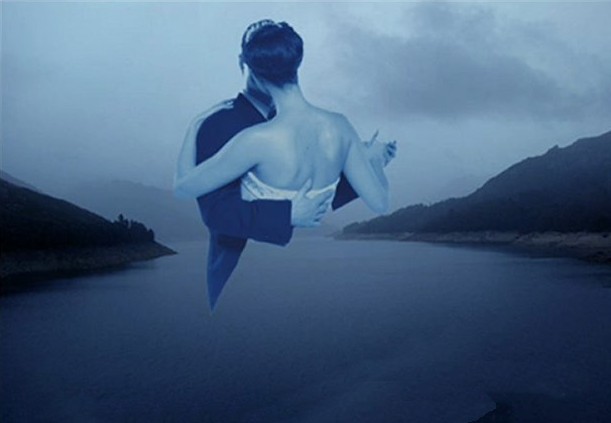 |
|
2016
Danube Waltz Itinerary
|
|
April 09: Day
01 |
Saturday |
Passau,
Germany |
|
April 10: Day
02
|
Sunday |
Passau,
Germany |
|
April 11: Day
03
|
Monday |
Linz and
Český Krumlov, C.R. |
|
April 12: Day
04
|
Tuesday |
Melk and
Dürnstein, Austria |
|
April 13:
Day 05
|
Wednesday |
Vienna,
Austria |
|
April 14: Day
06
|
Thursday |
Bratislava,
Slovakia |
|
April 15: Day
07
|
Friday |
Budapest,
Hungary |
|
April 16: Day
08
|
Saturday |
Budapest,
Hungary |
|
April 17: Day
09 |
Sunday |
Budapest,
Hungary |
|
April 18: Day
10 |
Monday |
return home |
|
|
|
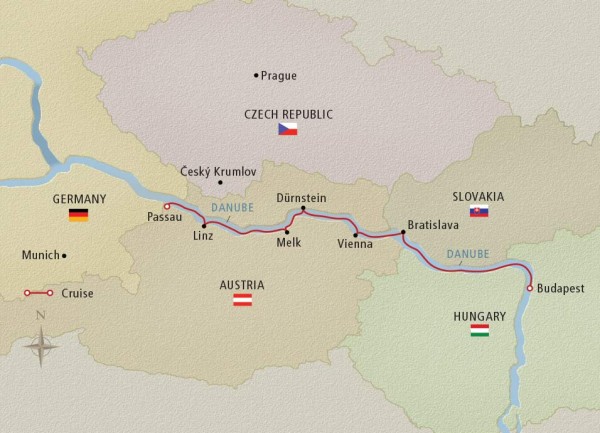 |
 |
REVIEW OF THE 2016
DANUBE RIVER CRUISE
Written by Rick
Archer
May 2016
So how
did this year's river cruise turn out? Marla
and I both gave our trip an A+. It was a very
wonderful experience.
Everything worked close to perfection... perfect
weather, no travel hitches, great friends, efficient
staff, beautiful scenery and interesting places to
visit.
|
|
| |
| |
|
Unfortunately, when I say 'close to perfection',
please keep in mind there is no such thing as a
perfect trip.
First of
all, I promised Waltz to everyone.
"There
will be Waltz on the
Danube Cruise. You have my word on it.
I don’t know when and I don’t know where, but I
am not about to travel 5,000 miles to Eastern
Europe and miss dancing the Waltz in Austria.
That would be totally wrong. So you can
assume I intend to deliver on my promise."
I made quite sure to get my own Waltz in.
On the first night of the trip, I requested
Englebert Humperdinck's Last Waltz.
Marla and I enjoyed our Waltz on the Danube
thoroughly.
And then
for good measure we waltzed again at two restaurants
that had small trios to serenade the guests.
However
I did not get the chance to Waltz with the other
ladies on the trip and now I feel guilty.
My second regret is for a friend's
misfortune. As usual, Air France was a jerk.
They like to play games with carry-on luggage.
For some reason, the standard size for carry-on
luggage in Europe is smaller than America.
So we get over there just fine only to face
harassment on the way back. In particular, I
am not a big fan of Air France... they played this
same game with us last December.
Sure enough, they made two of the ladies in
our group check their carry-on bag.
However, this time Air France added insult
to injury when one of the baggage handlers
stole the jewelry out of one woman's LOCKED
carry-on. How despicable is that?? I
am sure the lady is heartsick and I don't
blame her a bit.
The final sad note came when Marla fell and
hurt herself during one of our long walks.
She broke three ribs.
During the year, Marla and I try to walk
three miles every day. We go over to
the lovely Houston Arboretum in Memorial
Park. In addition to the health
benefits, the purpose of walking every day
is to train for long walks on our travels.
Often times Marla finds hotels right in the
middle of everything so we can see many of
the key places simply by walking over there.
Over the years, I have noted that Marla and
I have completely opposite styles of
walking... she looks up and I look down.
I stare at the ground much of the time.
This is a habit I developed from walking my
dog on the grass as a little boy. I noticed
when I looked down it was easier to avoid
stepping in dog stuff. On the other hand,
Marla likes to look up in the trees for the
pretty red cardinals. This is what led
to her downfall.
In Bratislava, the capital of Slovakia, we
were taking a walk on a paved trail
alongside the Danube. For some reason, our
walking trail had raised bumps in the
middle. Why those bumps were necessary
on a walking path escapes me.
Looking up as she walked along, Marla
unexpectedly caught the toe of her foot on
one of those raised bumps and tripped badly.
Unable to break her fall, she stumbled
forward several steps, then she fell hard on
her right side.
Marla has been in considerable pain ever
since. However, I have to hand it to
her. For the next four days, Marla kept walking.
On her final day, Marla covered sixteen miles.
Marla refused to let the pain prevent her
from seeing everything she possibly could.
Marla gets my Amazon award for toughness.
I could not be more proud of her.
|
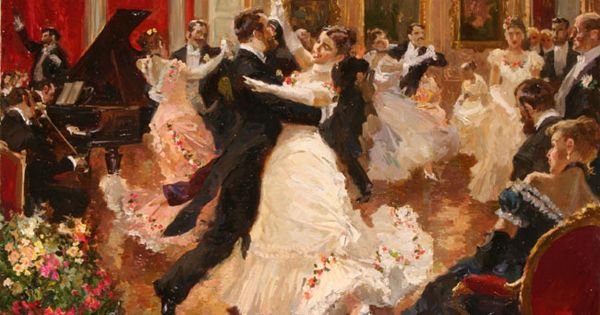


This was the bump that tripped up Marla
|
In the case of
the fabled Danube River, it is the second longest river in
Europe after the Volga in Russia. The Danube starts in
the Black Forest mountains of southwestern Germany and flows
for some 1,770 miles (2,850 km) to its mouth on the Black
Sea.
Along its course
it passes through 10 countries: Germany, Austria, Slovakia,
Hungary, Croatia, Serbia, Bulgaria, Romania, Moldova, and
Ukraine.
From its first recorded history as the northern border of
the Roman Empire, the Danube has formed the boundary between
great empires. One need only look at its banks lined
with castles and fortresses to know the Danube has long
served an important military purpose. In addition, its
waters have served as a vital commercial highway between
nations.
So here's a question. Which is longer,
the Danube River or the Mississippi River?
Take a guess; I will answer in a moment.
|
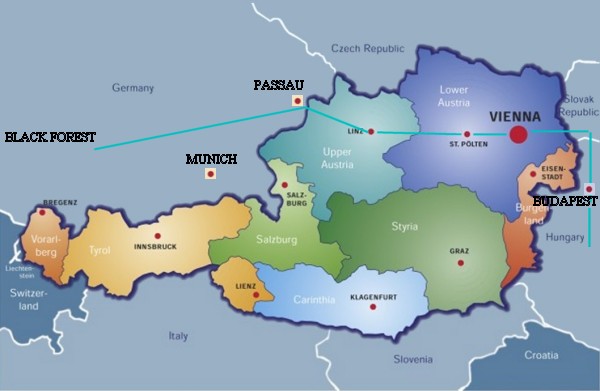 |
Thanks in large
part to the incredible natural beauty of the river, the
Danube’s majesty has long been celebrated in romantic music.
The famous waltz An der schönen, blauen Donau
(1867; The Blue Danube), by Johann Strauss, became the
symbol of imperial Vienna and has remained emblazoned there
ever since.
In case you are interested, I wrote a story
about the origin of the Viennese Waltz as
well as the background of the Blue
Danube. The Blue Danube
is practically the national anthem of
Austria. In fact, this Waltz
is traditionally broadcast by all public-law
television and radio stations exactly at
midnight on New Year’s Eve, and on New
Year’s Day it is a customary encore piece at
the annual Vienna New Year’s Concert.
You might be surprised to discover the song
was a total flop when it was first
introduced in Vienna. So what made the
song so popular? You can find out
here:
The Blue
Danube
So what is with this "River Cruise" concept?
One highly effective way to explain the
"River Cruise Phenomenon" is to let you read
Watching the World Go By.
This is an article I wrote three years ago
after our first river cruise. You will love
the pictures. However, one word of
warning... the temptation to join us on our
next river cruise will become overwhelming.
Read at your own risk.
For many, their interest in a river cruise
usually starts with an advertisement on TV.
No doubt you have seen the ads
for Viking River Cruises on TV. One
South Carolina couple we met on the
ship said they saw a Viking cruise
commercial each week when they watched
Downton Abbey.
This couple said they found
the images utterly irresistible. They could
not help but notice the romantic pictures of
classic European landmarks seemed especially
pretty when viewed from the perspective of
the river.
Those
advertisements are legitimate. Marla and I
have seen every location pictured and we can attest
these landmarks are just as stunning in person as
they are in the promotions.
Marla
and I have now taken four river cruises with Viking.
Previously we did the
Rhône in
France (2014), the
Rhine in
Germany (2015), the
Bordeaux
wine countryside in southern France (2015), and now
the first leg of the
Danube in 2016.
Our previous favorite river was the Rhône in
France. I thought the Rhône had to be the
most beautiful river imaginable.
I was wrong... the Danube is even prettier.
|
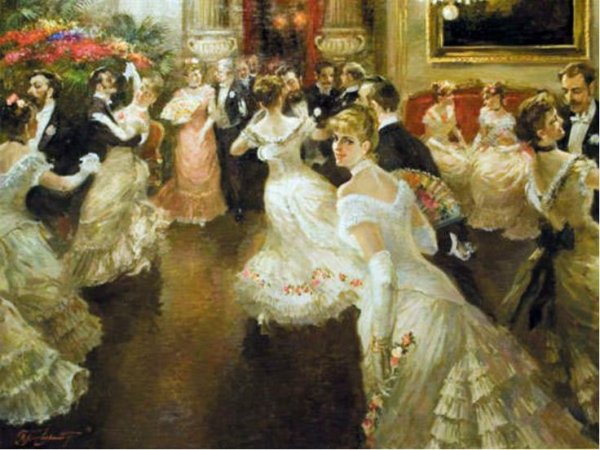
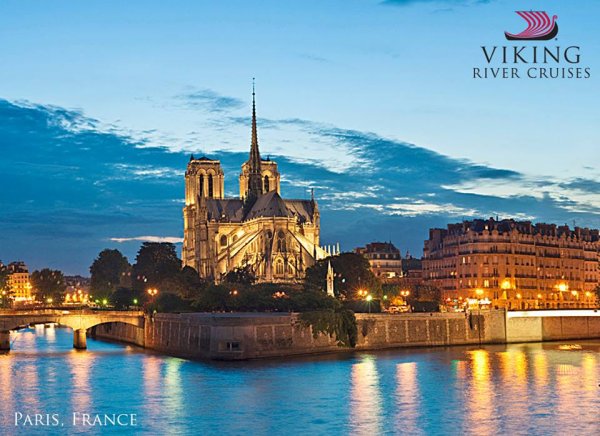
Notre
Dame in Paris situated on the lovely River Seine |
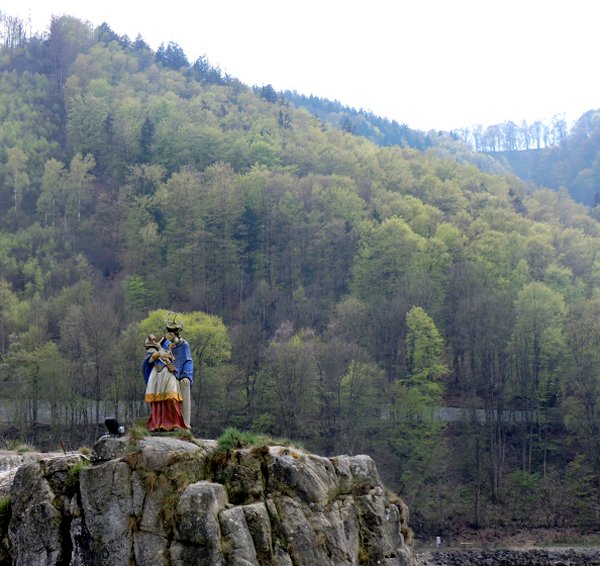 |
The Danube River begins in the heart of
Germany's Black Forest in southern Bavaria.
From Bavaria, the Danube flows east. 2,000
miles later, the Danube ends up in the Black
Sea on the border of Romania and Ukraine.
Oddly enough, the source of the Danube is
located only a mere 20 miles north of the
mighty Rhine River. It seems unlikely that
two of Europe's greatest rivers pass each
other so closely yet go in opposite
directions.
On any given winter day, a snowfall could
blanket both the Rhine and Danube at the
same time. Depending on where the wind takes
the snowflake, the droplet could end up in
the North Sea (Rhine) or the Black Sea far
to the east (Danube).
The Danube River is so long that Viking
Cruise Line has divided the river into two
different trip segments. Viking uses
Budapest, the capital of Hungary, as
its midpoint.
Our trip started in Passau, a
German town on the Danube one mile west of
the Austrian border. Our trip took us
through Austria, Slovakia, and on to
Budapest in Hungary.
During our trip, I learned that the second
leg of the Danube stretches from Budapest to
Bucharest, Romania. For those of you
unfamiliar with Eastern European geography,
Viking's second leg of the journey consists of Hungary, Serbia,
and Romania. The map below will make
this more clear.
|
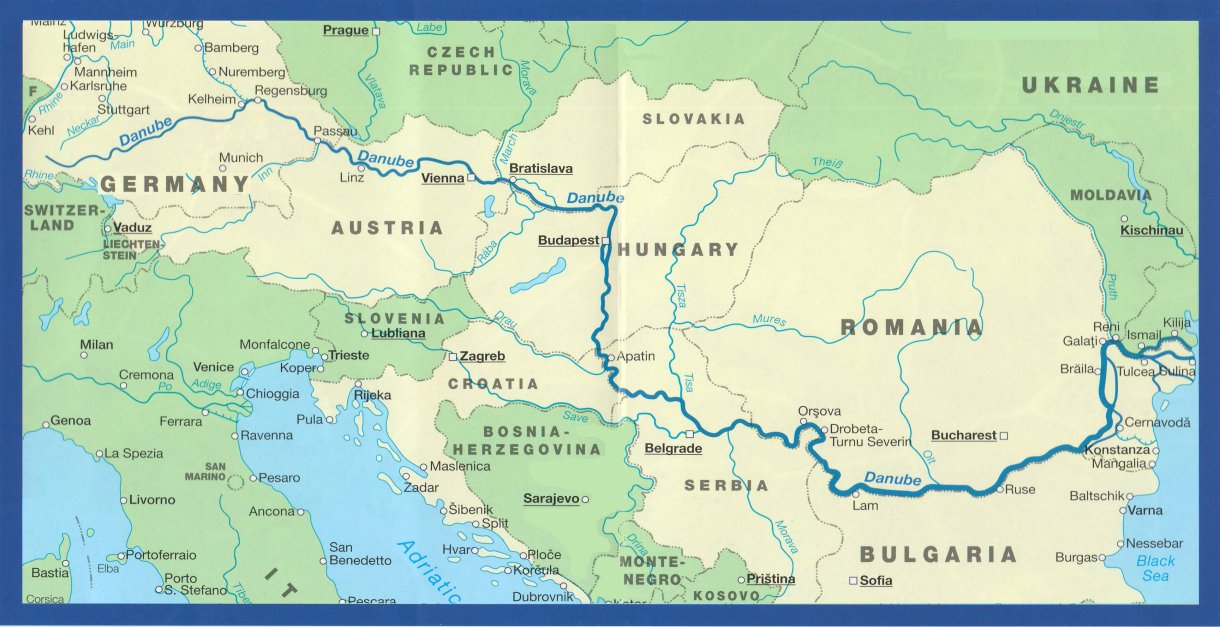
This particular area of the world is home to
the Balkan and Carpathian mountains. There
is one place where the Danube slices through
giant mountains onwards to the Black
Sea. As one can imagine, the river passes
through canyons reminiscent of our own Grand
Canyon and the Colorado River. The scenery
is said to be unbelievable.
I don't need to be convinced of how
beautiful the second part is. The first leg
of the Danube proved to my satisfaction that
this is the most beautiful river I have ever
seen.
Rolling hills, quaint villages, clock
towers, lovely churches, stunning
mountaintop castles, and beautiful forests
line both sides of the Danube throughout.
As our ship gently drifted down the river, I
could almost hear Maria singing the hills
are alive with the sound of music.
|
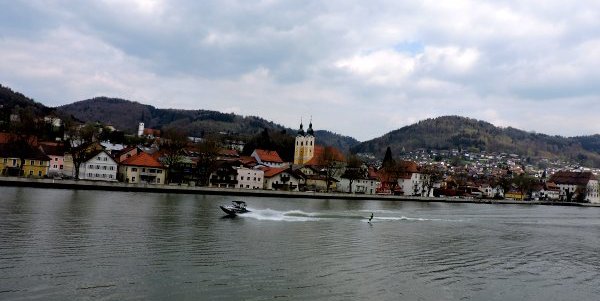
Incidentally, the Mississippi is 33% longer than the Danube.
|
| |
|
 |
This river cruise was especially satisfying
to me on for a very unusual reason. The trip
gave me the chance to settle the score with
a former girlfriend over a silly argument.
Yes, indeed, it gave me immense satisfaction
to prove that Janet Gunthrie, my girlfriend
back in the late Eighties, was wrong wrong
wrong about a lingering debate from 2009.
Janet moved to Australia twenty years ago,
but we have stayed in touch via email.
Over the years, I have enjoyed
matching wits with her. Ridiculously
smart and smart-mouthed to boot, Janet has
long derived immense fun from needling me
about my Newsletter mistakes. Unfortunately,
I have to admit that I might make a mistake
every ten years or so. Since Janet is
a born proof reader, she catches everything.
Consequently Janet has had the upper hand
way too many times. Over the years I
have been forced to admit more mistakes than
I would prefer.
However, there was one particular debate
that has long stuck in my craw. It bothered
me because I made a DELIBERATE MISTAKE and
Janet would not take my word that I was just
kidding.
So what was the issue? Seven years
ago, I concluded a story by saying I wanted
Marla to schedule a cruise to Austria.
Hey, I was just kidding... I knew full well
that Austria had no port.
Janet refused to take my word for it.
Instead she pounced. Janet took great
delight pointing out the absolute stupidity of my
suggestion. Janet's precise word for my
folly was 'IMPOSSIBLE!!'
Here is how it all started. One day in May
2009 I received a request from a couple
named Richard and Mary to help them learn the Viennese
Waltz in preparation for their vacation trip
to Vienna, Austria.
Teaching that lesson turned out to be a bad
mistake. During our lessons, I had to listen
to Richard and Mary talk with excitement
about their trip. These two were going to an
actual Ball featuring the Waltz! Richard had
their tux and Mary had her fancy dress.
Now they wanted to be the best dancers as
well. All
they needed was the footwork.
|
| |
|
The thought of Waltzing at a Grand Ball in Vienna sounded
like the coolest thing imaginable. In
addition, they were going to travel the
countryside and see places like Salzburg,
the Austrian city made famous in the
Sound of Music.
Their excitement drove me absolutely nuts.
Each time I saw them, images of Mozart,
Strauss, Viennese Waltz, Blue Danube, the
Emperor's Waltz, fancy gowns, and swirling
dancers floated in my head. At the time, I
could barely contain my envy. The thought of
NOT seeing a glamorous place like Austria, a
mountain paradise considered one of the most
spectacular countries in the world, was more
than I could bear.
Just thinking about it all made me feel
sick. I decided the only way I could deal
with my frustration would be to share my
pain in the SSQQ Newsletter.
So I wrote something that got me in trouble
with Janet.
The May 2009 SSQQ Newsletter:
Issue Three
DANCING
THE VIENNESE WALTZ IN AUSTRIA
From: Mary
Sent: Wednesday, May 06, 2009 4:27 PM
To: Rick Archer
Subject: Private
Lessons - Austrian type of Waltz
Rick, after
enjoying our two months of East
Coast Swing lessons at SSQQ earlier
this year for our daughter's
wedding, my husband Richard and I
could be considered advanced
beginner or intermediate level swing
dancers.
Now we are
traveling to Austria in mid June of
this year to attend a Ball. We
wanted to have some private Waltz
lessons to get us up to speed in
short order. Is there anyone who can
help us out in this regard? Thank
you for your help, Mary & Richard
RICK ARCHER'S
2009 NEWSLETTER NOTE:
Now
doesn't that sound like fun?
Richard and Mary are going with a group
to Austria. On one of the nights, they
are supposed to have a dance class in
Viennese Waltz with a trip to
the Grand Ball on the following evening.
Richard and Mary decided the smart thing
to do was to get a head start, so they
asked for my help.
I enjoyed
helping them get ready to Waltz, but now
I am really envious! I want to go too.
In my opinion, Marla needs to schedule
a cruise to Austria!
Please pester her to do so.
|
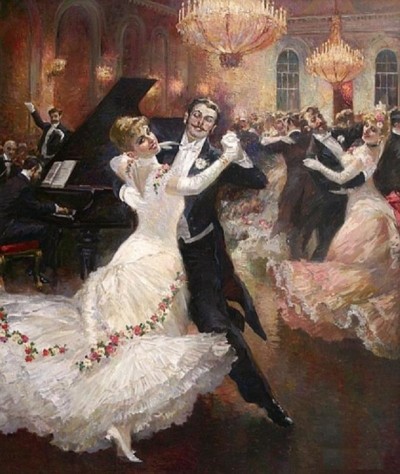
The Viennese Waltz
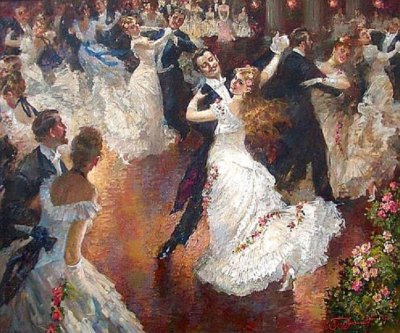
Swirling gowns
and beautiful dancing
|
| |
|
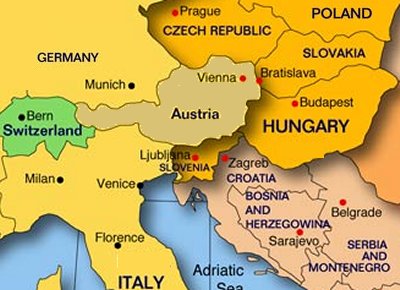 |
As a bit of background, I am a Geography buff. That is one of the
reasons I like to travel. I have
memorized every capital in the world.
I also know that modern Austria is a
land-locked country. However, it
wasn't always that way. The Austrian
border once extended all the way to Venice.
However, when Prussia under Chancellor
Bismarck attacked Austria from the north,
Italy saw its chance and wrested control of
Venice away from Austria in 1866.
Austria was forlorn... gone was their
Venetian pearl.
So of course I was just teasing about a cruise
to Austria.
I assumed everyone would give me the
benefit of the doubt!
I never expected anyone would bother to
reply.
But I was wrong. Indeed, someone did
reply.
|
|
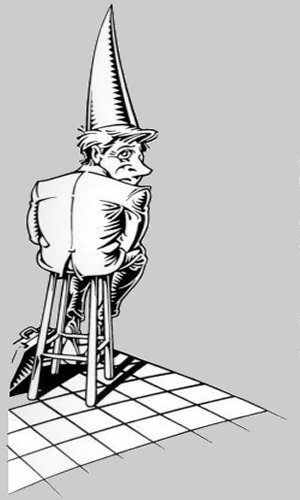 |
From: Janet
Sent: Friday, May 15, 2009 12:11 AM
To: dance@ssqq.com
Subject: get out
your atlas, dodo
A cruise to
AUSTRIA??? Are you out of your mind?
Did you know
that Austria is landlocked and not a
cruising destination?????
Get out your
atlas, babe, because you made a
slight blunder on that one!
Hint to
Rick....here's a word for you:
IMPOSSIBLE!
Cruise
destinations all have large bodies
of water associated with them...you
know, so that a REALLY big boat can
dock there.
Even Noah's
Ark isn't going to make it to
Vienna!!
Go sit in the
corner.
|
|
| |
|
When I got Janet's email, I rolled my eyes.
Only Janet from another Planet would be
goofy enough to challenge me on GEOGRAPHY,
my forte.
I could not believe Janet seriously believed
I had made a mistake. Well, some
things never change. Obviously Janet was still the same
old pain in the butt as
always.
Truth be told, I missed our sparring days.
Back when we dated, Janet could never resist
giving me a hard time. Janet was
exceptionally good at finding ways to tease
me. This note showed that Janet had not lost her touch.
However, this time her teasing really got
under my skin. The nerve of her to
think I was that stupid! Feeling
the rankle, I decided to argue with her.
So I resumed
our sparring for old time's sake.
|
 |
| |
|
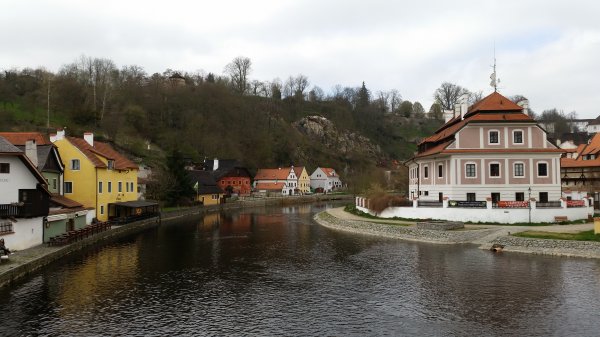 |
From: Rick Archer
Sent: Friday, May 15,
2009 11:18 AM
To: Janet
Subject: RE:
get out your atlas, dodo
Dear Janet,
Give me a break!
Regarding the cruise to Austria, why do
you have so little faith in me? I just
said that to provoke people and have
some fun.
I never thought you of all people
would believe I was that stupid.
I not only know where Austria is, I know
that it is surrounded by Switzerland,
Germany, Italy, Hungary, the Czech
Republic plus a couple Balkan countries
nearby. However, with a skeptic like you I
doubt I will convince you of anything.
I assume you believe me when I say I
know where Austria is?
On the other hand,
knowing you, maybe not. ;-)
|
| |
|
From: Janet
Sent: Monday, May 18, 2009 10:31 PM
To: Rick Archer
Subject: Re: get out your
atlas, dodo
Okay, okay, okay,
I'll give it up. I was only trying to
yank your chain anyway. However, a wee
bit of me still suspects that you
momentarily mistook Vienna for Venice or
Austria for Australia.
Not that I doubt
your geographic brilliance, but we all
make mistakes sometimes...especially as
we get older. And God knows you are
getting older.
Methinks you
mistook Viennese Waltz for Waltzing
Matilda, you know, Austria for
Australia. So any time you want to
come clean on that obvious flub, let me
know. I won't think any less of you.
Well, maybe a little.
Very good on the
knowledge of Austria's surrounding
countries... but I remain skeptical.
We all know you could have checked it
out a bit on any map.
Therefore it does
not count as real genius or any
conclusive measure of your geographic
intelligence. You will have to blow me
away with something better than that.
By the way, did
anyone else call you on this glaring
error? Or did everyone just think you
knew what you were talking about given
your superior abilities at naming
capitals of the world?
And, by the
way, is anyone pestering your wife for a
cruise to Vienna?
|
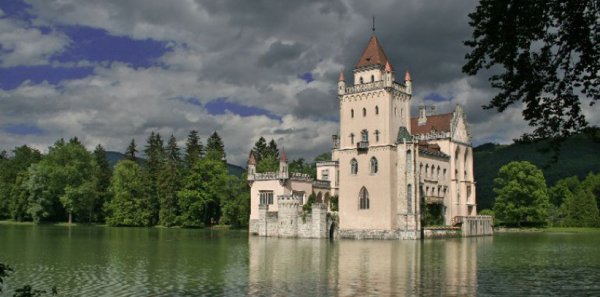
 |
| |
|
 |
From: Rick Archer
Sent: Tuesday, May 19,
2009 11:05 AM
To: Janet
Subject: RE:
get out your atlas, dodo
No one to my
knowledge is pestering Marla for a
cruise to Vienna.
That said,
Janet, I promise you if Marla ever
figures out how to schedule a cruise
trip to Vienna, I will get down on my
knees and worship her even more than I
already do now.
By the way, you
are a pain in the ass, but don't ever
change. You are perfect just the
way you are.
|
| |
|
Well, Janet won that round.
But you know how they say life is long.
Back when I was arguing with Janet in 2009 I had never heard of a 'River
Cruise'. That all
changed when the Viking Cruise line began
running Sunday morning commercials on CNN in
2013.
Those advertisements showed a long, slender ship
sailing down lazy European rivers amidst
stunning scenery. A picture is
certainly worth a thousand words... I
immediately put down my crossword puzzle and
took notice. That vision opened my
eyes to ideas I had never before
imagined. Maybe Noah's Ark was a
possibility after all.
Unbeknownst to me, from her comfy chair four
feet away, Marla was watching that same ad
with an equal amount of interest. At
the time, neither of us knew what the other
was thinking.
This went on for three more Sundays. Each
Sunday I forgot about Wolf Blitzer and
stared at those Viking ads with intensity.
Finally I couldn't take it anymore. I had to
say something or go crazy.
"Marla, have you ever considered taking us
on one of these river cruises?"
Marla nodded.
"Of course,
Rick.
I think about it all the time!
Unfortunately, the problem is the cost.
When one adds in the cost of air travel
to Europe, these trips are not cheap.
I have no idea if
our cruise customers would be willing to
support this new concept."
Then Marla paused for a moment.
"But you know
what? I am more than
willing to try!"
Marla's answer made me grin. Marla had just
committed to an exciting new gamble. That's
my girl!! I deeply hoped Marla would be as
successful with this new feature as she had
been with her cruise intuition in the past.
I really wanted to try one of those Viking river cruises!
As it turned out, Marla's instincts were
right on the money. In addition to Marla and
me, a lot of our friends were watching those
same commercials. These ads on river
cruising were capturing the
imagination of a lot of people. Marla caught
the surge of interest just as it was
breaking with our first river cruise in France
back in 2014.
So here we are in April 2016 and this Danube
trip marks our fourth river cruise. In
particular, this
trip was dramatically enhanced by its
destination... Austria!
In 2009, Janet said: "Impossible!!"
In 2016, Rick replied: "River Cruise
to Austria"
Never say Never.
|
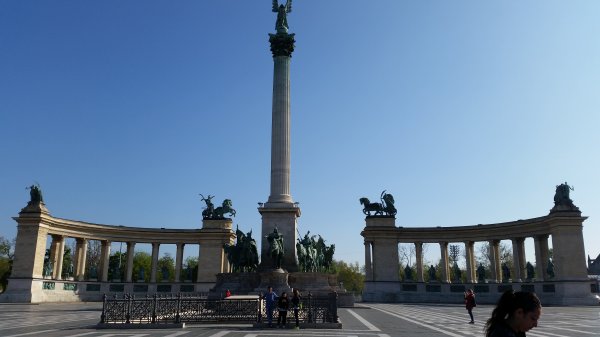
Heroes Square in
Budapest.
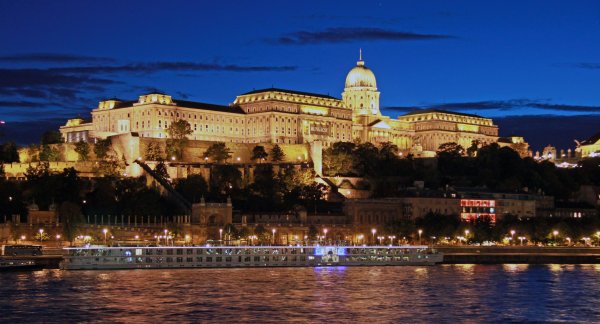
Buda Castle in
Budapest
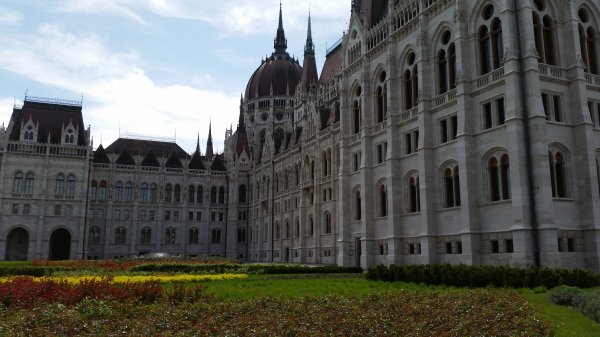
Rear view of the
Budapest Parliament building |
Back in 2009, I told Janet I would get down
on my knees and worship Marla if she ever
scheduled a cruise to Austria.
Well, consider it done. At the end of the
trip, I got down on my knees and kissed her
feet.
I am so fortunate to ride Marla's coattails.
Her river cruises have opened up an entire
new world for me. These cruises have
allowed me to explore Europe in a way that
my imagination could have never have
anticipated all those years ago.
If you have never been on a river cruise, I
can say there is something very special
about these trips. On a river cruise,
you can sit in a chair at the front of the
ship and prepare for a spectacle. Gaze
in awe as a neverending tableau of beautiful
landscape unfolds before your very eyes!!
There is nothing to spoil your view or your
concentration. No billboards, no
sounds of the city, and no litter exist to
irritate. Instead, there is strictly
peace, beauty and serenity. If you
wish, you can turn on your head set and
listen to the musical strains of Mozart and
Strauss as you float merrily along.
Some say a river cruise might be the most
perfect vacation of all. You won't get
any argument from me. A 300 mile sail
along the most lovely river in Europe is
incredibly inviting.
To me, a river cruise is so relaxing.
The ship has a viewing deck complete with
rocking chairs. While I gently rock back and
forth, I am treated to scenery that is
unbelievably pretty.
And perhaps a glass of wine?? I enhance
my experience with a choice of Austrian wine
such as Riesling or Prosecco. As I watch the rolling hills
and endless forests pass by, friendly
waitresses make sure my wine glass is never
empty for long.
By the way, did you know the wine is free? I can have as
much as I want. Comforted by
occasional sips of
sparkling Riesling wine, I sit there smiling
in a dreamlike trance.
We all work very hard for 40, 50 years or
so. Many of us have reached that magic
moment when it is time to receive a reward
for all our hard work. To me, this
trip is the perfect reward.
As they say, there are no pockets in
shrouds. Now is the time to find that
elusive quality known as joy. And that
is exactly how I feel on these river
cruises.
When I am on these trips, I
feel a contentment very close to what one
might describe as 'Heaven on Earth'.
|
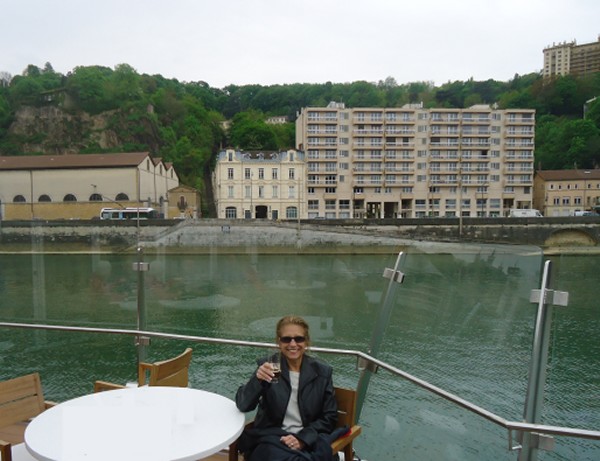
Marla
is watching the world go by in Lyon, France
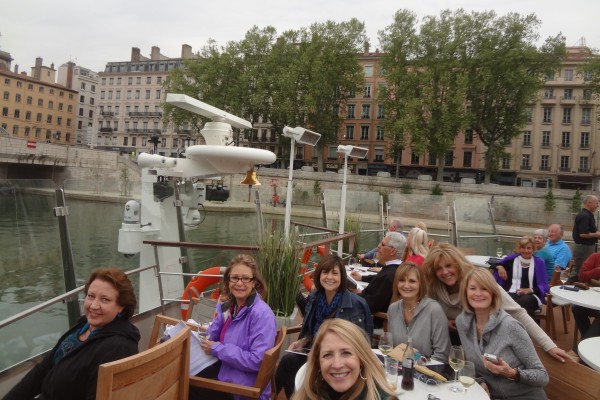
I am
not the only one who enjoys watching the world go by
|
| |
|
Rick Archer's
Note:
The next four chapters are
related to the
history of Germany, Austria, and Hungary.
If you prefer to skip
the History of the area,
then click
Friendship |
|
| |
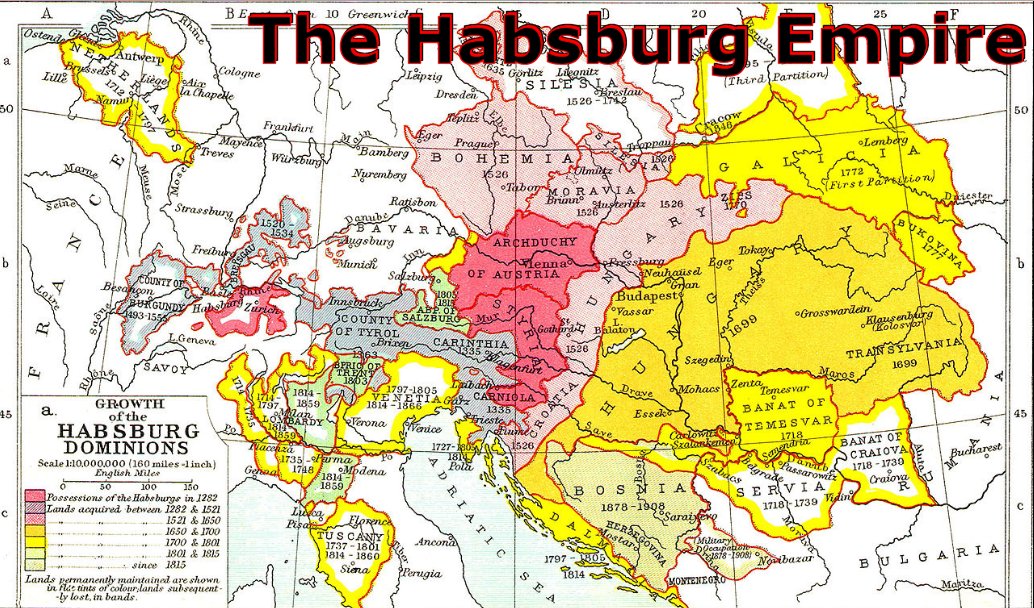 |
| |
In addition to my transcendent rocking chair
moments, I always make sure to use these
trips as
opportunity to learn something.
Every one of my river cruises have had a
serious side to it. These trips are
extremely educational because they allow me
to visit remote areas that were previously
inaccessible. I learn so much about
history and politics this way.
On this trip, I learned that Austria and
Hungary have been linked for hundreds of
years. It turns out that as Austria
goes, typically so goes Hungary. The
Danube connects
Vienna to its nearby neighbor
Budapest 130 miles downstream.
My guides in both cities talked in detail
about the Austro-Hungarian Empire and the
Habsburg dynasty. American
history books concentrate on England,
France, and Spain, the countries that fought
over control of North America.
However, I discovered it is impossible to
understand Europe without grasping the
enormous influence of the Habsburg Empire.
Using Austria as its power base, members of
the giant Habsburg family guided European
destiny for 600 years until World War I put
a permanent end to their reign.
In particular, I developed an interest in
Maria Theresa, Empress of Austria.
Few people have had
as much influence on modern European history
as Maria Theresa, the only female who ruled
the Hapsburg empire.
Maria Theresa, the
eldest surviving child of Charles VI, Holy
Roman Emperor, was born in 1717 in Vienna.
Succession rights
in those days were complicated.
However, the untimely death of her
brother and selective blindness to
another claim to the
throne set Maria up as the
presumptive heiress. She
reigned as absolute sovereign for 40 years
beginning when she was 23.
At one point, Maria Theresa ruled
over the territories of Austria, Hungary,
Croatia, Bohemia, Mantua, Milan, Lodomeria
and Galacia, the Netherlands, and Parma.
From what I read, Maria Theresa was an
effective monarch. However, Maria
Theresa is probably better known for her
incredible fertility and skill at marrying
off her children.
Maria is one of the
few royals in European
history who actually got to marry the
one she loved instead of
the ones her
father picked for her.
One betrothed
prince died of smallpox.
Religious differences
disqualified
another match. Political
unrest ended
another potential mate. Eventually
she married Francis Stephen, the son of the
Duke of Lorraine in France.
Francis
came to visit the royal family in Vienna
when he was 15.
Apparently Francis and Maria
were strongly attracted.
The ensuing teenage romance
somehow overcame all the
usual obstacles and politics
to become a powerful marriage.
They say that Charlemagne of France is the
Father of Europe. Maria Theresa of
Austria is either the Mother of Europe or
perhaps the better term would be
'Mother-in-law' of Europe.
Maria Theresa and her husband Francis I had
sixteen children.
There were
eleven daughters,
including Marie Antoinette,
and five sons.
Of
the sixteen, ten survived to adulthood.
These various children went on to become the
Queen of France, the Queen of Naples and
Sicily, and the Duchess of Parma. Not
to be outdone, two of the boys, Joseph II
and Leopold II, became the Holy Roman
Emperor as well as rulers of Austria.
One thing the
Hapsburgs were really, really good at was
marrying off their children.
This is how
Maria Theresa became
known as the Mother-in-law
of Europe. At
the time of her death, Maria
Theresa had
over two dozen grandchildren.
Her unusual penchant
for marrying off her children had
much to do with expanding the immense
Habsburg influence across Europe, but, as we
shall see, it would come with a horrible
price.
Despite the neverending European
wars such as the
Thirty Years War, War of
Austrian Succession, Seven
Years War and a host of other
conflicts, Maria Theresa
and her relatives did a pretty good
job of keeping the peace by making alliances
with others. They
made these alliances through marriage.
Austria was never a particularly effective
military power. So, as they say, if
you can't make war, make love.
Austria's main defense seemed to be
intermarriage with European royalty. Eventually
every ruling family of
Europe had Habsburg cousins or second cousins.
The theory was it is harder
to go to war with family than
people you didn’t
play with as kids.
There were two sides of the family.
Charles V of Spain (1500-1558)
was responsible for that. Charles was
the most famous Habsburg. Through
inheritance, Charles brought together under
his rule extensive territories in western,
central, and southern Europe, and the
Spanish colonies in the Americas and Asia.
At one point he was simultaneously the Holy
Roman Emperor, ruler of Austria, the Spanish
Empire and the Netherlands. His domain
covered the earth. Of Charles V, it
was said he ruled over "the Empire on which
the sun never sets".
Charles was the man who made Spain rich.
He sanctioned the conquest by conquistadors
of the Aztec and Inca empires, thereby
extending Spanish control across South and
Central America. This vast expansion
of territory and the influx of South
American silver brought Spain to the height
of its power.
Due to his control of Austria, Spain, parts
of France and the Netherlands plus his
control of Germany territory as the Holy
Roman, Emperor Charles came closer than
anyone in history to being the universal
ruler of Europe.
At the end of his reign, Charles decided his
realm was too big for one man. He
handed off Austria and the Holy Roman Empire
to his younger brother Ferdinand and gave
Spain to his son Phillip II. From this
point the two sides of the family remained
allies, but went their separate ways.
So with all those Habsburgs running Europe,
what put an end to the Habsburg Dynasty?
Now that is an interesting story.
The most obvious answer is that Austria picked
the wrong ally... Germany. However, a
less obvious answer is that quality of
the leadership had been greatly diminished
by in-breeding.
By the time World War
I put an end to the Habsburg Dynasty, the
family had
basically in-bred the
brains out of the ruling class.
Due to weak leadership, they
couldn’t figure out how to avoid killing
each other in the trenches.
So what happens when you marry your
relatives?
Sigmund Freud believed incest was the only
universal human taboo alongside with murdering
your parents.
As it turned out, this widely-held
superstition became actual science when
studied in the Twentieth Century. For
example, a study of children born in
Czechoslovakia between 1933 and 1970 found
that nearly 40% of those children whose parents were
first-degree relatives were severely
handicapped.
The Habsburgs were said to have a proverb:
'The best spouse for a Habsburg is
another Habsburg.' The ruling
Habsburgs deliberately practiced
close-relation marriages with the goal of
keeping their bloodlines pure. One can
only surmise they were unaware of the cruel
law of genetics that would seal their fate.
The Hapsburg Empire of Austria started in a
small canton in Switzerland way back in the
13th century. Once the family moved
to Austria they began to make strategic family alliances.
Eventually Hapsburg monarchs
ruled Austria, Hungary, Germany, France,
Croatia, Belgium, England, Italy, Poland,
Ukraine, Romania, Switzerland and other spots as well. Their empire grew
exponentially until the 18th century.
Strangely enough, the secret of their success
- marriage - led directly
to their downfall.
The Habsburgs were strong proponents of
inter-familial marriages, preferring to
avoid mixing with the dirty blood of lesser
people. When one family
rules all these different countries, each
country required its own Hapsburg monarch.
This meant that each Habsburg generation was
under pressure to generate 10-20 new leaders,
preferably all men.
A major problem was illness. Medicine
was no match for many scourges of the day.
Smallpox, tuberculosis and plague were just
as feared by the royals as by the peasants.
Take, for example, the huge tragedy
that led directly to the eventual downfall of the
French monarchy. Dauphin Louis had
been groomed from birth to take the place of
his father, King Louis XV.
('Dauphin' is the French word for 'Prince')
A
handsome, strapping man,
Dauphin Louis
was in many ways the exact opposite of his
womanizing father, King Louis XV.
A devout, well-educated man with a keen sense of morality,
Louis
was very much committed to his wife, Marie-Josèphe,
as she was to him. Marie had 13
pregnancies, four of which were stillborn.
The first
surviving child was a girl born
in 1750, died in 1755. The second
surviving child was a boy,
Louis Joseph,
born 1751.
Louis Joseph
was said to be brilliant and energetic.
The third child was a boy, Xavier, born 1753
and died a year later. The fourth
surviving child was
Louis Auguste,
born 1754.
It was now 1761.
Louis Joseph
was 10. Louis Joseph was the favorite child of his
parents, very handsome and very bright.
His parents poured their heart and soul into
him. Tragedy struck when the poor boy
was pushed off a toy horse by a friend.
Complications arose from a broken hip. The
boy developed tuberculosis in the hip and
died.
France had lost a
promising heir. Fortunately they still had
Dauphin Louis,
the boy's father. Four years passed.
It was now 1765. At
age 36,
Louis
was extremely popular in France. The entire
country eagerly awaited the rise of this
handsome, clean-cut Prince to ascend to the
throne. Then suddenly
Dauphin Louis
fell sick. He had tuberculosis, the
scourge of Europe.
When
Louis
died quickly, all of France was in shock.
The pain from his loss was nearly
unbearable. To see a man who was so vibrant
and held so much promise die without warning
made no sense. The cruelty of the loss left
the country in despair.
Worst of all,
France had just lost the man they hoped
would be their next King!! Who was next in line
for the throne?
France was stuck with
Louis Auguste,
a young man who was totally unprepared to
become the next king.
Louis Auguste
was 11 when his beloved father died.
Sad to say, but this boy had
been badly neglected by his parents.
When compared to his deceased brother,
Louis Joseph,
it was obvious the talent wasn't there, so
this kid had been ignored since birth.
At this point,
Louis Auguste
was painfully shy and lacked confidence.
More ominously, to date he had received next
to no training in leadership.
Unfortunately, his mother was so distraught
at the death of her husband she never
recovered. With his father dead and
his mother crippled with grief,
Louis Auguste
was forced to fend for himself as best he
could.
Nevertheless,
Louis Auguste
became King at age 20. Unfit for
the job, he made mistake after mistake. Sad
to say, at age 38,
Louis Auguste
was executed. Oh, did I forget to
mention his wife was Marie Antoinette?
Ill-prepared to lead his
country, King
Louis XVI received the
guillotine for his mistakes.
One can only imagine a
different ending had his father or older
brother been in charge. The point of this story
is to explain just how difficult it was in
those days to produce a strong male heir.
Even when successful, injury and illness
often ruined the best efforts of the Royal
families to maintain their lineage.
So what was the solution?
That's simple... have as many children as
possible and hope for the best. The
Habsburgs understood the need to reproduce
at all costs. But they took it too
far.
Although inbreeding was common among all
European royalty,
the Habsburgs had the worst possible luck
with it. Over time the evidence of serious genetic issues
began to show.
Some highly undesirable family traits were intensified. As generations of family
members intermarried, the Habsburgs became
prone to epilepsy, gout, dropsy, and
depression. The most prominent sign of their
familial connection was the Habsburg
jaw, a lower jaw that jutted out
from the face. One would assume they
would figure it out, but apparently not.
At one point, the jaw problem led to dark
humor. Whispers suggested the reason
the Habsburgs all married each other was
because they were too ugly for any other
royalty to marry them.
Over time, the mutations kept piling on.
In the 16th century and beyond, the
family
began producing non-viable or non-fertile
offspring. The branches of the family tree
began dying out.
Being a very strong Roman
Catholic family (the head of the senior
branch of the family was the Holy Roman
Emperor), they blamed their deformed
children on themselves for angering the Lord
with their sinful behavior.
One cannot help but feel sorry for these
people. They believed a curse had been
placed upon their family when in reality the
Habsburgs unknowingly
carried on with the very behavior that caused
the problems. Still, it is hard
believe that some priest didn't quietly
point out that incest and
intermarriage was clearly outlawed in the
Bible. Maybe they didn't listen.
Charles II (1661-1700), the Spanish King, was the last of the royal
Habsburg Spanish line. This poor man had a jaw so large that he
couldn't chew and he had a tough time
speaking.
As if that wasn't enough, Charles
had other profound disabilities. He was
mentally disabled and infertile.
Charles did not learn to speak until the age
of four. He did not walk until eight.
He was treated as an infant until he was ten
years old. Fearing the frail child
would be overtaxed, his caretakers did not
force Charles to attend school.
Young Charles was indulged to such an extent
that at times he was not expected to be
clean. Whenever his half-brother Don Juan
José came to visit Charles, he covered his nose and insisted
that the King at least brush his hair.
Take a look at the picture of Don Juan José.
Handsome man, yes? Don Juan José got
his good looks from his mother María
Calderón, a popular actress who became the
mistress of Philip IV, King of Spain.
By the way, Philip IV was also the father of
Charles II. Staring at the pictures of
the two men, it is hard to believe that Don
Juan José and Charles II had the same
father.
So who was the mother of Charles?
Maria Anna was the daughter of the Austrian
Emperor Ferdinand. The royal marriage
was guided by politics and Philip's desire
to strengthen his relationship with Habsburg
Austria.
Perhaps it helps to know that Maria
Anna was Philip's niece...
One child was in-bred, the other child was
the issue of a beautiful woman whose 'dirty
blood' mixed well with the King.
Inadvertently, sad, pitiful Charles II
became the eternal poster boy for the
dangers of inbreeding.
Charles II died in 1700,
childless and heirless, with all potential
Habsburg successors having predeceased him.
It was a blessing in a way. Seriously, if
ever there was a royal line that needed to die
off, this was it.
The only thing that saved the Austrian side
of the family was Maria Theresa. By
defying her father and marrying someone
outside the family, she inadvertently
injected some much-needed new blood into the
family tree.
Thanks to Maria Theresa, the Austrian
Habsburgs held onto power two hundred years
longer than the Spanish side of the family
line.
|
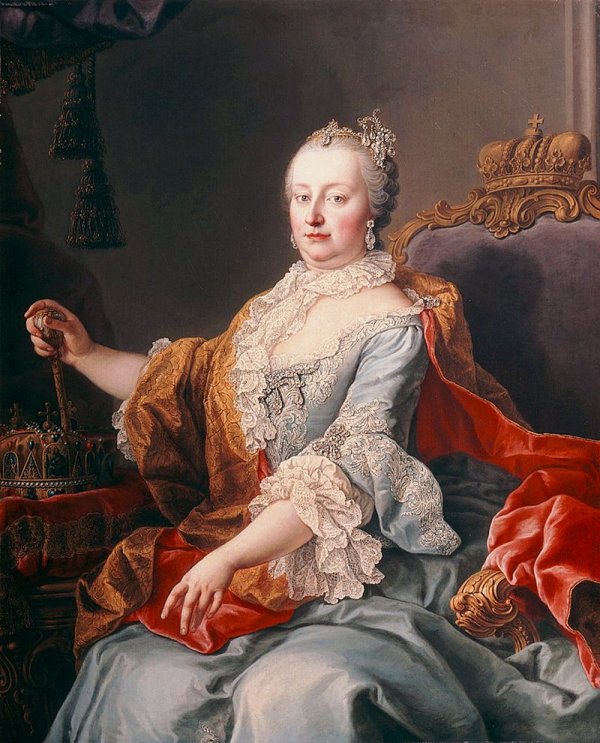
Maria Theresa (1717-1780), Empress of Austria
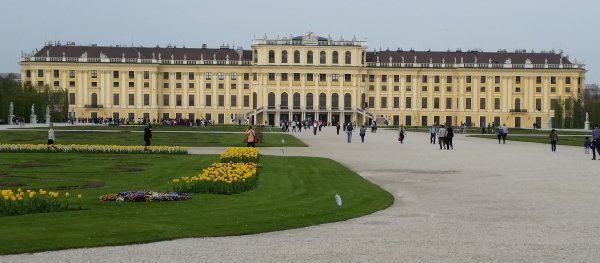
Schönbrunn Palace in Vienna, the summer home of
the
Hapsburgs. This rear view shows some of
the gardens.
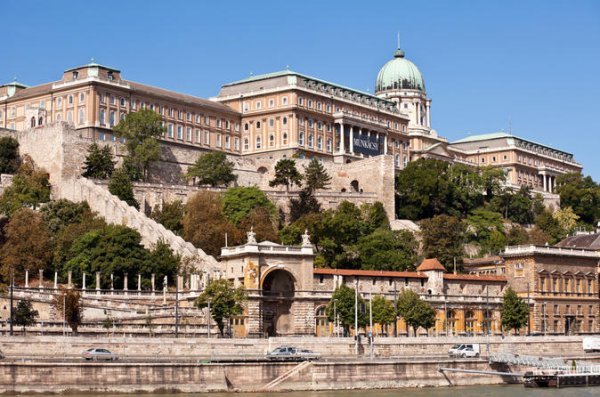
Buda Castle in Budapest, a place Maria Theresa
visited frequently
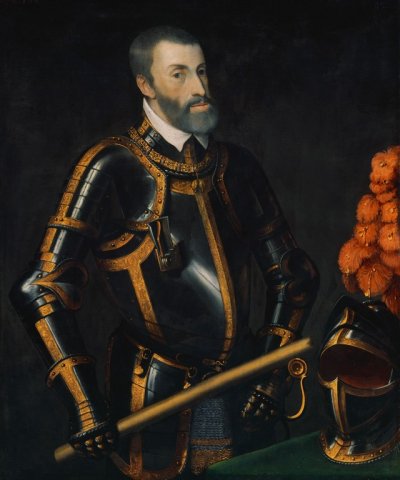
Charles V (1500-1558). Take note of that
prominent jaw
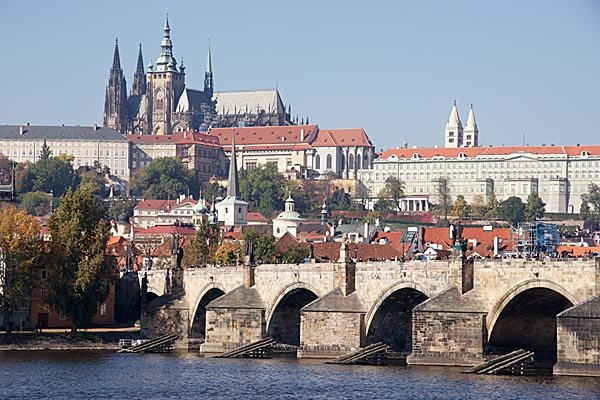
Maria Theresa
rebuilt Prague Castle in the 18th century.
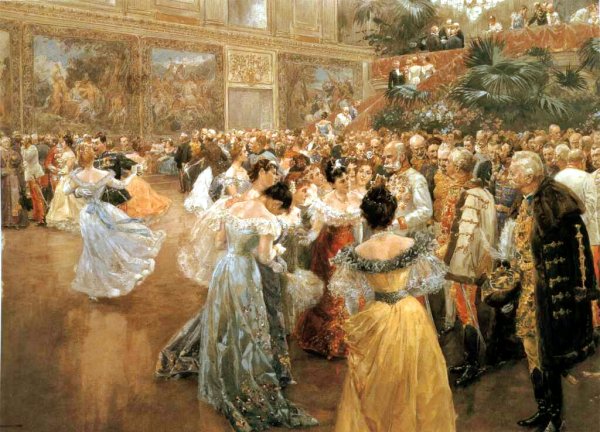
Habsburg Grand Ball
in Vienna
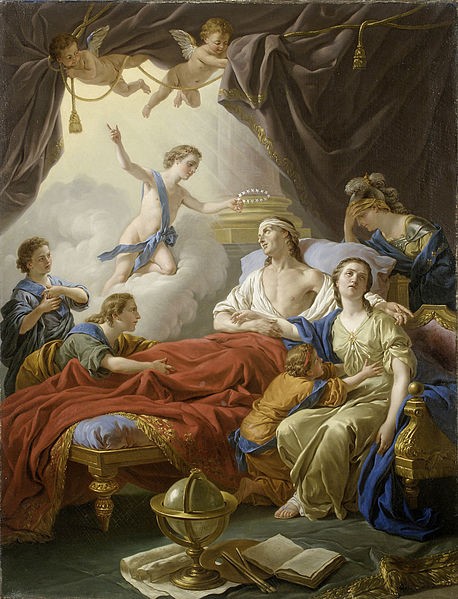
The great
tragedy of France - the handsome prince dies young.
Had this talented man lived to become King, France might
still be a monarchy today.
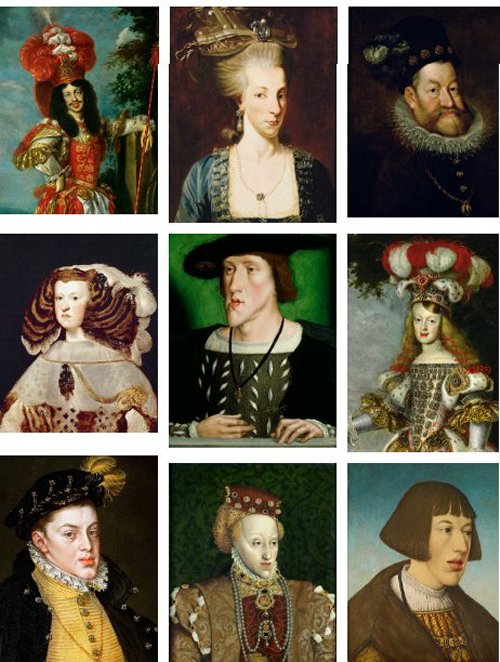
The Habsburg Jaw. Not a pretty picture
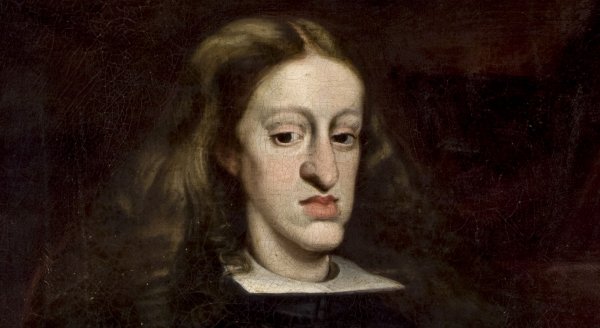
Charles II of Spain... the last of the Spanish
Habsburg line
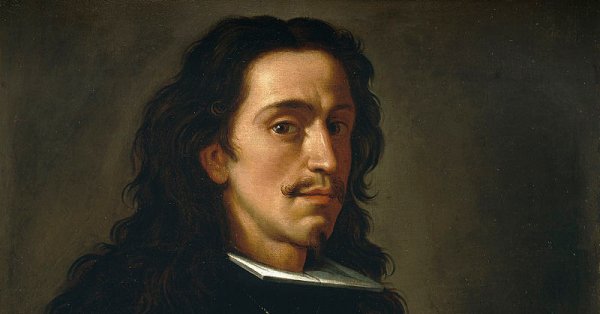
Don Juan Jose, illegitimate half-brother of
Charles II
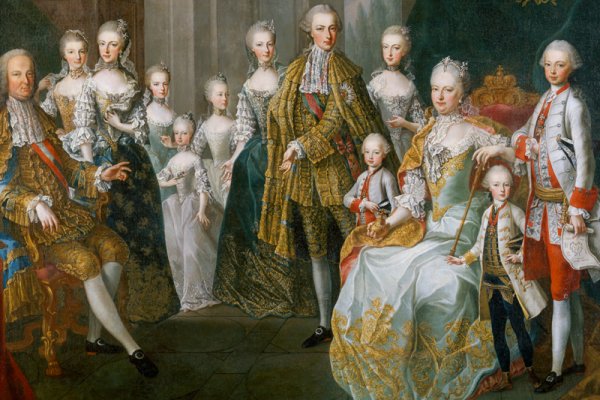
Maria Theresa and family
|
| |
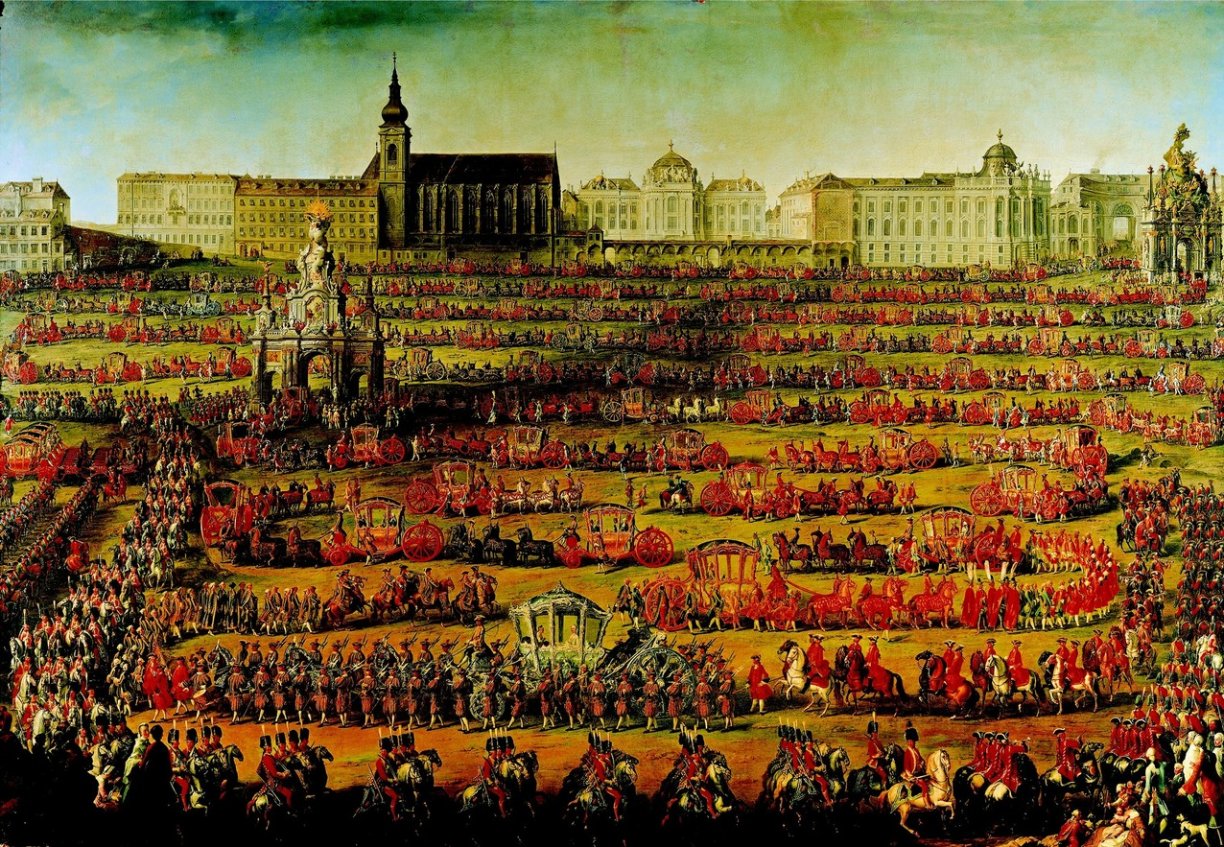
Entry of the Bride
(The 1760
Vienna Marriage of Joseph II to Isabella
of Parma)
by
Martin van
Meytens
Rick's Note: I
explained that the Habsburgs took marriage
seriously, but I never knew 'how seriously'
until I saw this picture. It
took me five minutes just to figure out that
the bride was in the white coach in front.
She got lost in the parade.
|
| |
| |
| |
Each time I take a trip to Europe, I learn a
different slice of history.
It all started with our first European
cruise
in 2008. To my surprise, I discovered
that Italy was not even a country until
1848. That was my first clue that I
didn't have any idea how modern Europe was
formed. Curious, I dug a little deeper
into Italian history when I returned home.
I added a brief synopsis of
Italian unification as part of my
write-up of the trip.
On our 2012 cruise to the Baltic Sea, I
learned the fascinating history of
Russia. The story about
Napoleon blew me away.
On our 2014 Rhône trip, I learned about the
history of France. In particular, a
stopover in Paris following the river cruise
allowed Marla and me the chance to see the
Palace of Versailles. This visit was
so inspiring that I spent an entire week
back at home researching the French
monarchy. If you are curious, I wrote
two excellent stories:
Versailles and
Marie Antoinette
On our 2015 Rhine cruise, I learned about
the intense history of
Germany.
A similar thing happened on the 2016 Danube
River Cruise. I used this trip to fill
in the remaining gaps in my education of
European history. When I was in Vienna, my
tour guide spoke of the Austro-Hungarian
Empire. Then when I went to Budapest, my
tour guide also spoke of the Austro-Hungarian
Empire. Every day I would listen to
the tour guides and try to make more sense
of it all. Then I would go back to my room
and use my Kindle plus the ship's free Wifi
to Google my way to one history lesson after
another. Slowly but surely I began to
comprehend the alliances between the countries
that caused the domino effect leading up to World War I.
Considering I am far from an expert, the
history of Austria and Hungary is far too
complex for me to be completely confident in
my explanation. Nevertheless I will do
my best.
To understand
Hungarian history, it is first
necessary to understand Austrian
history. To understand
Austrian history, one must
understand the Habsburg dynasty. We will start with
the House of Habsburg.
The House of
Habsburg was responsible for the
creation of the
Austrian Empire. It started with
Rudolf I of Habsburg (1218 – 1291)
who was elected King of Germany in
1273. Rudolf I acquired the
duchies of Austria by defeating his
mighty rival, King Ottokar of
Bohemia, in the 1278 Battle on the
Marchfeld. His new territory
would remain under Habsburg rule for
more than 600 years, forming the
core of the Habsburg Monarchy and
the present-day country of Austria.
Due to its
location in central Europe, Austria
seems to have been left pretty much
alone by the Great Powers of Europe
for the next 400 years.
Austria's main enemy was the
Ottoman Turks who attacked Austria
on twenty different occasions.
While fending off the Turks, Austria
gained further territory through the
familiar Habsburg technique of
marriage.
Hungary
came under Austrian control through
battle in 1699. This was a
strange time for the Habsburg
family. Just as the Spanish side
of their family came to a bitter end
with the death of pitiful Charles II
in 1700, the Austrian side of the
empire was hitting its stride. This
is about the time when Maria Theresa
took over. Unfortunately,
Maria Theresa was the first to
suffer the lash of Prussia, the
country that would become Austria's
longtime nemesis. In 1742, Prussia's Frederick the Great
lopped off Austria's huge northern
province of Silesia. It was a
painful loss.
It was now
1800. The turn of
the century marked Napoleon's reign
of terror. Napoleon badly
embarrassed Austria's generals time and again.
He beat them on four separate
occasions. In particular, Napoleon won a
stunning victory against much larger
forces at the 1805 Battle of
Austerlitz fought on
Austrian soil. From that
point, Napoleon waltzed into Vienna
so to speak.
Austria was subjugated by France and
told to cease all fighting 'or
else'.
|
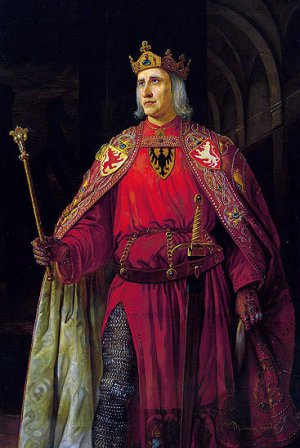
Rudolf I
|
| |
|
However, ten years later Austria had the
last laugh. 19th Century Europe
resembled a game of Risk where
territories changed hands after every
move. Following Napoleon's disastrous
trip into Russia, Austria
took a gamble and jumped back in the fight
now that Napoleon was on the ropes.
English, Prussian, Austrian,
and German armies
cornered Napoleon at
Waterloo (Belgium)
and finished off the Devil.
Following Napoleon's defeat at
Waterloo in 1814, Austria made out
like bandits. All the territory
Austria had lost was returned.
After all the shame heaped
on it by France, suddenly Austria was a multinational empire
and one of continent's four great powers.
Geographically
Austria was now the second largest
country in Europe after the Russian Empire
and the third most populous after Russia and
France. Austria was the largest and
strongest country in the German
Confederation.
So Austria was poised for greatness, yes?
Well, yes, but they blew it.
|
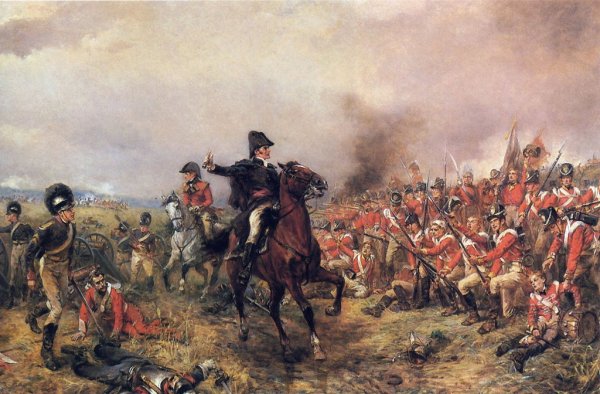
Wellington at
Waterloo. Napoleon is
finally defeated
|
|
| |
|
The unaligned
German States were the
Grand Prize of 19th Century Europe.
This situation is very confusing, so
some explanation is in order.
Germany had such a strange past, I
think the easiest way to explain it
would be to use an American analogy.
Let's pretend
that one day early in 1776 America's original 13
Colonies received word from England
explaining King George was fed up
with all the discord, but didn't
want to go to war over it. So
the Colonies could take a hike...
they were all on their
own. Since this message came
shortly before the American
Revolution, now there was no real
reason for the colonies to discuss
uniting. Although everyone in the
colonies spoke the same language and
had a similar culture, each colony
felt like it was quite capable to handle its
own affairs. Over the next two centuries, each colony
turned into a 'country' of its own.
|
|
|
|
If Virginia
ruled its own affairs for two
hundred years, it might feel
differently about being asked to
join the "United States" in 1976. That is sort
of what happened in Germany, except
that in its case, the separate
states had been on their own for two
thousand years.
The Germanic
people had never been conquered by
Rome. Rome got so fed up
trying to conquer these fierce
barbarians, they basically told to
barbarians to stay on their side of
the Rhine and there would be no more
fighting. Hence the various tribes
were allowed to develop without any
sort of central authority.
Over time the tribes
developed into city-states.
The more powerful city-states grew
larger and became provinces.
The more powerful provinces became
territories similar in size to the smaller
American colonies.
By the Middle
Ages, the Germanic area consisted of
300 entities. Some were large
territories, some were small
provinces and some were
city-states with a wall around the
town. Each entity had its own
leader, its own law and its own
army. In addition, there were
many pockets of land that belonged
to the Catholic Church. The
map was a huge jumbled mess.
Charlemagne
had come close to unifying the area,
but upon his death the Germanic
territories, provinces, and
city-states slowly regained their
autonomy. Each city-state and
province had a king-like "Prince"
who was in charge. Recognizing
a common bond, the Princes of the
larger provinces periodically came
together to elect a German
King. However, they
never gave the German King much
authority. This meant each
province pretty much continued to do
want they wanted. Mostly the
German King kept the peace by
preventing the larger states from
gobbling up the smaller ones.
The main link
between these
city-states/provinces/territories
beyond common language and culture
was Christianity. In time, the
title of German King
and the title of Holy Roman
Emperor became synonymous.
In addition,
what we now call "Germany" became
referred to as the Holy Roman
Empire, a political group
that consisted of three or four
dozen German provinces that defied central authority whenever it
suited them.
The position
of the Holy Roman Emperor
was strange... he had to answer to
the Pope and he had to answer to the
German Princes. In that
position, it was pretty tough to
tell anyone what to do.
Furthermore the Holy Roman Emperor
had no army to enforce his wishes.
It was a highly ineffective position
that relied on political skills to
achieve consensus to get anything
done. More often than not,
nothing got done.
Over time, the larger provinces kept
acquiring some of the small pockets of land around
them through marriage or purchase or
strong-arm tactics. Eventually their
borders began to touch each other.
These larger areas became known as the
German States with names such as Hanover, Brandenburg, Saxony, Bavaria,
Mainz, Baden-Württemberg and so on.
Out of all these different German States,
Austria was by far the largest. The
next nearest in size was Brandenburg
controlled by Prussia.
|
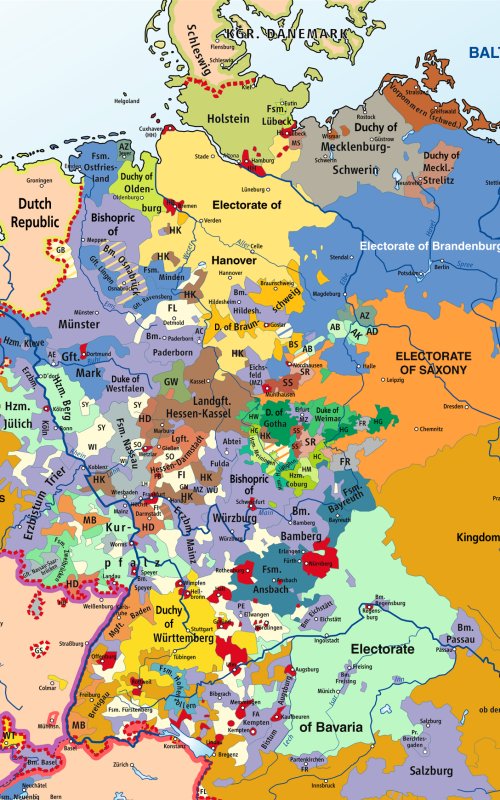
This is the Holy
Roman Empire. What a mess.
This is how
Germany looked "Before
Napoleon"
Note that this map
is more disorganized than the map below.
The map below is "After
Napoleon" |
| |
This
is a map of 19th century Europe
following Napoleon's defeat.
It helps to
explain the situation in the early
1800s. For the moment, forget about
France and forget about Denmark.
France was still licking its wounds
from Napoleon's defeat and Denmark
was too small to cause much trouble.
Instead
concentrate on everything
Orange.
Those Orange areas were territories
controlled by Austria. Then
concentrate on everything
Light
Blue.
Those Blue areas were territories
controlled by Prussia.
Then
concentrate on everything else.
All those different areas on the map were independent
states who belonged to no one but
themselves.
Yes, as hard as it
is to believe, back in those days,
Germany did not yet exist.
These small,
diverse territories were just
begging for a super-power to come in
and sweep them up one by one.
In fact, Napoleon had done just that.
The armies of the different
provinces were so disorganized that
they became easy pickings for
Napoleon's highly disciplined
troops. The German armies were
mowed down like bowling pins... one
or two at a time.
Now Napoleon
put an end to the complicated
Holy Roman Empire.
Thanks to him, the 300
city-states were consolidated down
to about 30 or so. They were
now referred to as the German
States.
Austria wanted
those
unaligned
German states
for its Empire. So did
Prussia.
The Game was
on and Austria was in the lead.
|
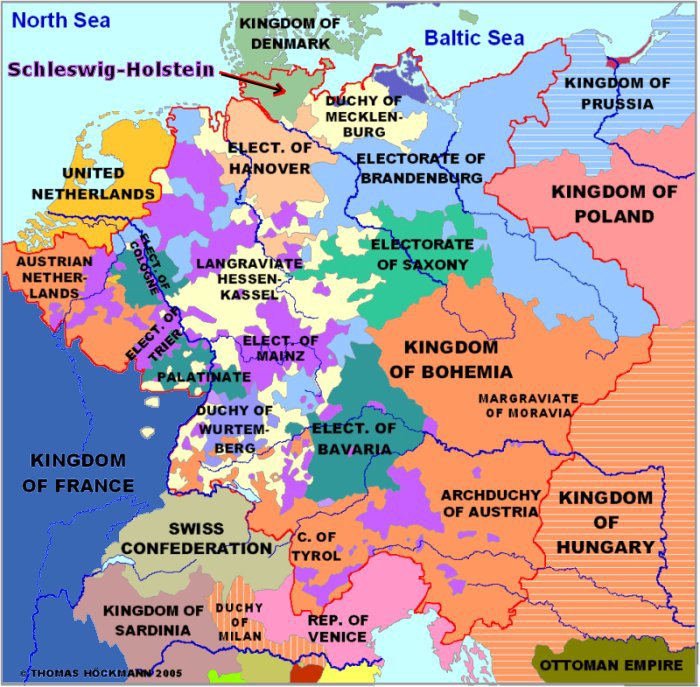 |
| |
|
There is, in political
geography, no Germany
proper to speak of.
There are Kingdoms and
Grand Duchies, and
Duchies and
Principalities,
inhabited by Germans,
and each separately
ruled by an independent
sovereign with all the
machinery of State.
Yet there is a natural
undercurrent tending to
a national feeling and
toward a union of the
Germans into one great
nation, ruled by one
common head as a
national unit.
—
New York Times,
July 1, 1866
|
So what exactly
does this New York Times
statement mean?
Using an
American analogy, recall
that Texas became a separate
nation in 1836 following its
independence from Mexico.
Now a
debate began over what to do
next.
Some
Texans wanted to remain
Texans and some Texans
wanted to become Americans.
The majority wanted to
become Americans, so in 1845 Texas
joined the Union.
However, every now and then
some Texans still talk about
seceding from the Union.
They said Texas did it once
(Confederacy), so what is
stopping Texas from doing it
again? Is anyone
ever happy?
Studying history, people go
back and forth. Some
groups want to be part of
something larger, some
groups want to be on their
own. Take
Yugoslavia for
example.
Following the
breakup of the Austrian
Empire after World War I,
the Great Powers of Europe
created Yugoslavia out of
thin air. All sorts of
different ethnic people who
didn't like each other were
thrown together. Each
group yearned for freedom.
Following World War II, the
iron fist of the Soviet
Republic made all these
groups behave whether they
liked it or not.
However, after the fall of
the Soviet Union in 1991,
ethnic strife broke out
almost immediately.
War ensued in the Balkans
and many innocent people
died needlessly.
In
place of Yugoslavia, we have
Montenegro, Slovenia, Serbia, Bosnia, Macedonia,
Kosovo and Croatia. Are
they happy now? Considering
all those fresh graves, one
can only hope so.
The
point is that in the 1800s
the German States
were in the same place as
Texas. Some wished to
maintain their freedom,
others wished to be part of
something larger.
|
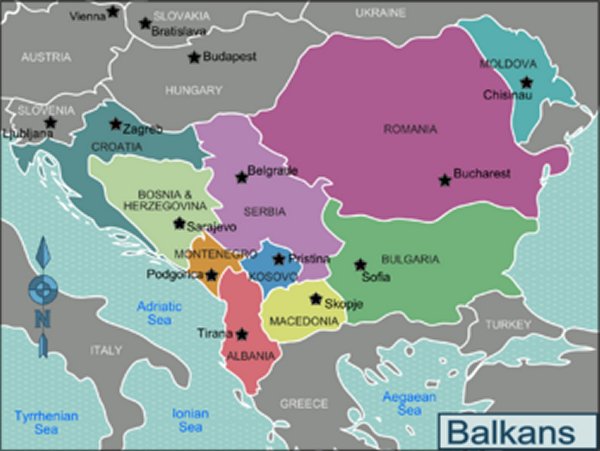 |
|
| |
|
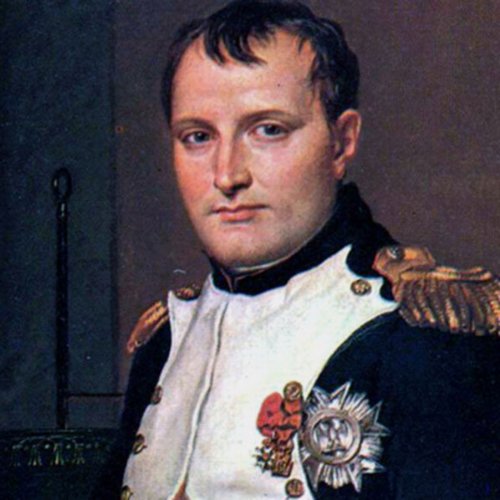 |
To be honest,
Napoleon really shook everyone up,
especially in the German region.
How was it possible that this
monster had beaten every single
German army? Could it happen
again? That, of course, was
the fear. If it wasn't France,
maybe next time it would be the
Russian giant. The lack of
security surely acted as a powerful
incentive to form a union.
In the wake of
Napoleon's demise, the
German-speaking people were
conflicted. On the one hand,
they enjoyed their freedom in
their own little municipalities.
Many preferred to maintain Germany
as the current quilt-like patchwork of
independent, monarchical states. On the other hand, they
also wondered
what it would be like if they joined
together and became big and strong
like their neighbors in France and England.
But just who
exactly was going to call the shots?
Who would be their leader?
Austria and Prussia raised their
hands.
For the first
half of the 1800s, Austria and
Prussia played a cat and mouse game
to win the loyalty of the different
German states. Austria clearly
had the inside track. For
centuries, "Germania" was split
into a few large states and hundreds
of tiny entities, each maintaining
its independence with the assistance
of outside powers, particularly
France. However, France was no
longer to be trusted. Not
after Napoleon.
Austria, the personal
territory of the Habsburg Emperors,
was traditionally considered the
leader of the German states.
Austria had been in charge during
the thousand year era of the Holy
Roman Empire. Now Austria
wanted to be in charge again.
Prussia had other ideas.
|
On paper, Austria and
Prussia were allies.
As recently as 1795, they made an
agreement to slice up Poland, each
taking a fair share for themselves. The two powers
fought Napoleon together. They worked together to
prevent Russian dominance.
However, once their eyes
turned to the German States,
both powers knew there would be
trouble someday.
|
|
|
The question
of using force was
out of the question. Force
might work for Napoleon, but these
German people were
their friends and relatives.
Furthermore, these States
were no military pushovers. After Napoleon
had shown the German States the danger they were in,
the States had
begun to form a German
Confederation using treaties
for mutual defense.
Austria
and Prussia were both part of this
confederation. To directly
attack another German state would be
like Texas attacking Louisiana. No, using force to
conquer the other German States was a bad idea.
Austria and Prussia didn't want to
conquer these territories, they just
wanted to dominate in much the same way the USA
throws its weight around in the
Caribbean.
So the two
powers used different tactics.
As usual, Austria used marriage.
Prussia used diplomacy.
However, this was a very slow
process.
Prussia decided to speed things up.
Prussia was willing to use force as
long as it could manufacture a
"reason". Although using force to conquer all
of Germany was out of the question,
why not use a gradual approach and
pick off one territory at a time?
That is when the perfect opportunity
presented itself... Prussia was able
to find a common enemy to attack and
show everyone what its military
could do.
Earlier I said
to forget about Denmark. Well,
change that. Think about
Denmark again. During the
1850s Denmark fought to maintain
control of Schleswig-Holstein
(see map), an area with many
German-speaking inhabitants. There was a
movement in that territory for
independence from Denmark.
That was just the excuse the two
powers needed. In the 1860s,
both Prussia and Austria leapt to
the defense of this territory and
started a war against Denmark.
Denmark was
easily crushed.
So here's a
question. After Denmark was
defeated soundly in 1864, did
Schleswig-Holstein gain its
independence? You have to be
kidding. That's not how things
worked in Europe. Just as they
had sliced up Poland together,
Prussia took Schleswig
for its own and Austria took
Holstein.
|
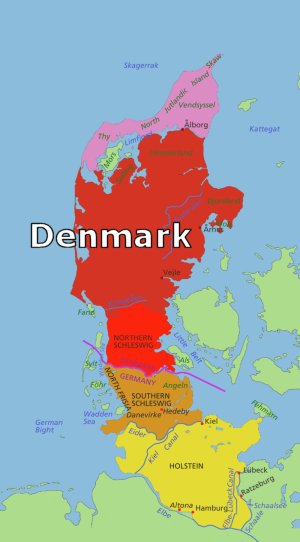 |
| |
|
 |
Now the two
superpowers eyed each other again.
Austria wasn't worried.
Austria was huge!! Even
better, virtually all the various
German states greatly preferred
Austria, the established power in
the region, over the aggressive upstart
Prussia.
For one thing,
the German states were very happy
keeping their independence.
Some people might want a larger
Germany, but the leaders of the
separate States didn't want to be
demoted and
dictated to by
a superpower. However,
Napoleon's shadow still loomed
large. His conquests had made it clear just
how vulnerable they were. None
of the German states wanted to fight
either Austria or Prussia, especially when
they would be the underdog.
So the German
states played the two superpowers
against one another. Like a
pretty girl with two suitors, the
German states made it clear that if
one boyfriend got a little too
fresh, the other boyfriend would
come to her aid.
So what was
Prussia to do? Prussia
realized that the German states were
aligned with Austria.
Austria had been the traditional
leader for centuries during the days
of the Holy Roman Empire.
Furthermore, Austria acted like a
well-behaved suitor. The
German states understood that
Austria was so big that it had grown
soft and had little desire to expand
its borders further by force.
On the other hand, Prussia was the
Big Bad Wolf. Prussia seemed
quite eager to expand its borders
and cause war.
Austria told
everyone to relax. If
Prussia started playing rough, the
armies of the German states combined
with the Austrian army would far
outnumber Prussia.
|
| |
Modern readers
might be confused about Prussia.
After all, there is no such thing as
'Prussia' on
today's world map.
Originally
Prussia was a small territory
located in what is now the corner of
northeastern Poland. Through
marriage, Prussia gained ownership
of the valuable Germanic territory
known as Brandenburg
(Berlin).
In 1742, Frederick the Great
expanded Prussia's strength and size
by
dramatically seizing Silesia,
a large Polish territory which
belonged to Austria. This easy
victory was informative because it
revealed to Prussia just how weak
the Austrian army was. This
message was then reinforced several
times by Napoleon. Prussia
suspected it had Austria's number.
Prussia's star
began to rise the moment Otto
von Bismarck came to power
in 1862. It was Prussia's
Bismarck who put the
eventual stake in Austria's heart.
When Bismarck came on the scene, Prussia was
strong, but unproven. The
odds makers suggested Prussia was
at best the fifth
strongest European power behind
England, France, Russia, and Austria.
Austria may
have had the upper hand on paper, but Prussia
had two things that Austria didn't.
Prussia had a far superior military
and Prussia had the ultimate weapon: the genius of Chancellor Otto Von
Bismarck.
As we shall
see, what a difference leadership
makes.
|
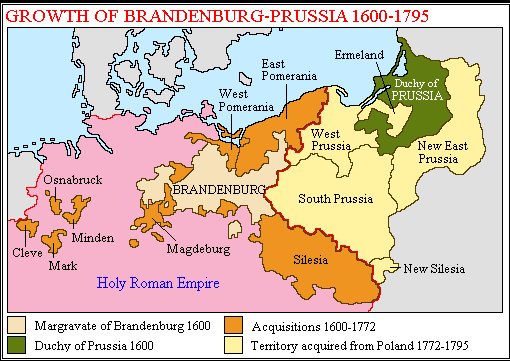
Prussia started
in the far right corner of the map.
Its big break came when it acquired
Brandenburg through marriage in
1618.
Frederick the Great and Otto von
Bismarck did the rest.
|
So how would
Bismarck persuade the German States to choose Prussia over
Austria?
Although
Bismarck (1815-1898) had not been born when Napoleon wreaked
havoc, his first break was handed to him
by Napoleon. The total
conquest of all the German areas by Napoleon not only put an end to
the Holy Roman Empire, it created the growing
mindset for unity that Bismarck would be able to take
advantage of.
United
we Stand, Divided We Fall...
never was this axiom more true in
the case of Germany.
Bismarck was a political genius who
understood that all the small, divided
German territories could belong to
Prussia if he made the right moves.
Furthermore Bismarck understood that
he did not need to conquer these
territories. Bismarck realized
he could unite them by political
means. All he had to do was
secure their loyalty. However,
that wasn't going to be easy because Austria had
the inside track.
Prussia was the new kid on the block
and Austria was the reigning bully.
So how does one conquer the
playground? You go and punch
the bully in the nose. Bismarck realized his first task was
to demonstrate Prussia's superiority
over Austria.
The
Schleswig-Holstein situation was the gift that kept
on giving.
In 1866,
Prussia claimed
that Austria reneged on
a territory agreement
regarding Holstein.
Bismarck
immediately sent Prussian troops to
occupy Austria's
Holstein
in upper Germany.
Most observers
agreed Austria had done nothing to justify Prussia's
occupation of Holstein. The general
consensus was that
Bismarck was deliberately trying to
provoke Austria. That said,
Bismarck's ploy worked like a charm. Austria
over-reacted and immediately called for the aid
of other German states
loyal to Austria to defend Holstein
against Prussia.
Now Bismarck claimed that Austria
had attacked Prussia!
Bismarck
used the Holstein hostilities as the excuse he needed to directly
invade Austria. Out of nowhere
Prussian troops streamed south into
Austrian territory.
Let's face
facts... both countries were spoiling for a fight. Austria was
fully prepared for the attack. Prussia had rattled its
sabers enough times to give ample warning. Not only
was Bismarck trying to pick a fight with Austria, Austria
was totally convinced it would put Prussia in its place once
and for all. For one thing, there were 600,000
Austrians and German allies facing 500,000 Prussians.
Furthermore the Austrians were fighting on their home turf
against the Prussian invasion and had well-prepared
defenses. Victory against the foolhardy Prussian invaders seemed
inevitable.
Only one
problem... Prussia had Bismarck and Austria didn't.
Unbeknownst to
Austria, Bismarck had made a secret alliance with
Italy, who desired Austrian-controlled Venetia
(Venice). Just when Austria began
to move northward to take on Prussia, Italy's
surprise entry
into the war from the south forced
the Austrians to divide their forces.
Italy's entrance into the war changed everything. Now
it was 600,000 Austrians and German allies facing 500,000
Prussians plus 300,000 Italians!
Austria was forced to split its men to fight on two fronts.
It was a master stroke on Bismarck's part.
Meanwhile, thanks
to the work of Chief of Staff Albrecht von Roon,
the Prussian army was better trained and
possessed superior guns. In
addition, the strategic
genius of Roon had
envisioned a new fighting technique known as
Blitzkrieg ("lightning war").
"Lightning war" it was.
It only
took seven weeks.
Austria never knew what hit
them.
After
Prussia won the
decisive Battle of Königgrätz,
the war
was over.
Prussia was supposed to be
the underdog, but it
certainly didn't perform
like an underdog.
Now Bismarck
performed his next master stroke. Victory in hand, Bismarck persuaded
the Prussian emperor to call off the dogs. Prussia
chose not to seek Austrian territory for itself.
Always thinking ahead, Bismarck made it possible for Prussia and
Austria to perhaps one day ally in the future.
In the
aftermath, Prussia annexed many of Austria’s former
German allies and permanently excluded Austria from German affairs.
This left Prussia free to incorporate all the
German states north of the Main River into a unified group
controlled by Prussia.
Now
Bismarck moved swiftly.
In 1870, he provoked a war
with France.
Amazingly, France
underestimated Prussia just
as Austria had.
Prussia blew France out of
the war and even marched
into Paris to make its
point. Fortunately
Paris was left unharmed.
Again Bismarck intervened with the
military to make sure that
France was beaten, but not
ruined.
Bismarck
was not done yet.
Prussia’s defeat of
Austria in the Seven
Weeks War in 1866
had confirmed Prussian
leadership
in
the
northern German
states.
Now the 1870
Franco-Prussian
War
won the support
of the
southern German states for
Prussia.
Austria
was gone and Prussia's
crushing victory over France
marked the end of
French
dominance in
continental Europe.
Thanks to Prussian
supremacy, Prussia was
looking pretty good as a
suitor. So now
Bismarck began the sweet
talk. Let's get
married!
The
German
states blushed. Sure,
Prussia was a nasty
bully, but he's big and
strong and he will keep us
safe. So they said
yes, let's get hitched.
In 1871,
Bismarck presided over the
political negotiations that
resulted in a unified German
Empire. German
Reich was the
official name for the German
nation state from 1871 to
1943. Informally, this
nation became known simply
as Germany.
As it
goes with mergers, someone
has to give up its name, so
over time,
the
Prussian name slowly died
out.
Although Germany was
the name of the new nation,
make no mistake about it...
the Prussian
leaders were in charge.
Unfortunately, as history
would have it, the Prussian military
mindset would have dire
consequences in the 20th
century.
But that's
another story...
|
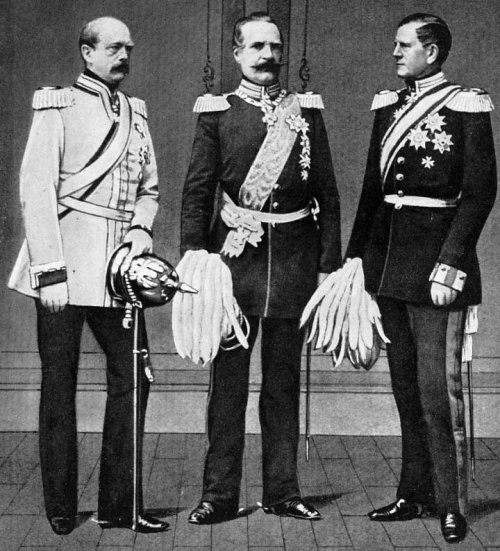
Bismarck with
Helmuth von Moltke,
Chief of Staff of the Prussian Army, and Albrecht von
Roon, Minister of War
|
| |
|
And what about
Austria?? For every winner, there has to be a loser.
The seesaw tipped.
Prussia was up, Austria was down. The Seven Weeks War of 1866
forced Austria to withdraw inside
its borders.
Austria's dreams of European dominance were gone forever.
Austria had lost Venice, Austria had lost Germany and
Austria had lost its pride. Austria would never be the
same again.
Following the
disastrous 1866 war, Austria was badly weakened. Fortunately, Bismarck was more interested in creating the
German nation, so Austria was left alone to lick its wounds.
All
the Habsburg Empire had left were Bohemia
(Czech Republic) plus its territories to the south and east
of Austria. Habsburg
emperor Franz Joseph took a major step
intended to consolidate the most
important remaining territory:
Hungary. Hungary
looked like it was ready to fight a war for its own
independence. To conciliate
Hungary, in 1867 Franz Joseph
granted equal status to Hungary with
the Austrian Empire. Now, for
the first time, Hungary got equal billing. It was now
the Austro-Hungarian Empire.
For a
while, this move paid off very well
as both nations entered a period of
prosperity and peace.
However,
threats abounded everywhere.
There
were all sorts of ancient
resentments surfacing in this part
of the world. Slavs, Croats,
Czechs, Poles, Rusyns, Bosnians, Serbs,
Slovaks, Slovenes, Italians,
Ukrainians, Magyars, Romanians,
Bulgarians...
Once all these different
groups of people saw that Hungary
had its freedom, now they
wanted their freedom as well.
| |
|
For the remainder of the Nineteenth
Century, Austria and Hungary had
their hands full trying to suppress
the constant uprisings in the
Bohemian, Balkan and Black
Sea areas.
Plus Russia
ominously began
to meddle in these areas as well.
Russia was the giant bear that everyone feared.
Thanks
to centuries of domination by its Mongolian conquerors, Russia was a slow
starter on the European scene. Russia was still
largely uneducated, overwhelmingly agricultural and backwards, but it had manpower
galore.
Those overwhelming numbers were what made
Russia so scary. Furthermore, the combination of
Napoleon and Prussia had destroyed Austria's confidence in its
military strength.
Austria was very
worried about Russia.
|
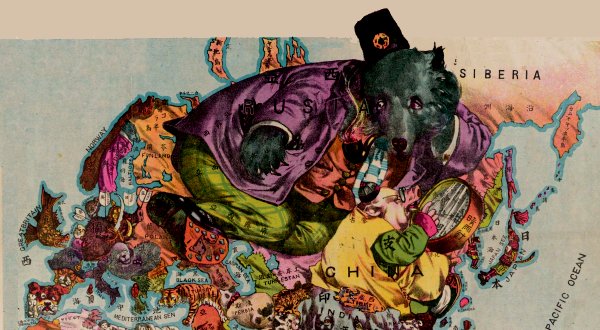 |
| |
Meanwhile
German chancellor Otto von Bismarck
had become the Father of modern
Germany. The area
was unified for the first time in
history.
Now Bismarck wanted
peace so he could consolidate this
diverse group of states.
Bismarck understood that the main
threat was Russia. In 1878,
Russia defeated the Ottoman Empire
in the Russo-Turkish War. This
victory gave Russia strong
influence in the Balkans, the same
area that had been giving Austria
and Hungary fits.
Noting
that relations
between Russia and Austria-Hungary
had quickly soured, Bismarck
saw an opening. In
1879, he
suggested an alliance with Austria.
Now
why would Austria become
Germany's ally?
Austria hated the German
Empire! Well, it
wasn't that complicated...
the enemy of my enemy is my
friend. Austria was
more afraid of Russia than
it was of Germany.
Bismarck
pointed out that Germany was
quite content with its new
borders and Austria agreed
that made sense.
So
Austria agreed to enter into the
Austro-German Alliance
of 1879. The two powers
promised each other support in case
of attack by Russia. This surprising alliance
reunited the
two arch enemies from the 1866
Seven Week's War.
This was another
brilliant move by Bismarck.
Bismarck was successful for two
reasons. First, he had
spared Austria from mass
destruction following their
war. Second, Bismarck
exploited Austria's growing fear of
giant Russia. Their mutual
dislike for Russia brought the two
nations together for a common cause.
Germany’s Otto von
Bismarck was thrilled.
Bismarck knew if Austria-Hungary were ever to fall
to the Russians, the Russians would
soon be at the German door. He saw this alliance as a way
to prevent the isolation of Germany
and to preserve peace, as Russia
would not dare wage war against both
empires. Or would it?
Three
years later, Italy joined
the Alliance. Italy
was seriously angry over
losing control of Tunisia to
France. Meanwhile,
Bismarck and Italy were old
friends from the 1866 war
that delivered Venice to
Italy. Italy's sour
grapes plus Bismarck's sweet
talk sent Italy running into
Germany's arms.
Watching carefully were
England, France, and Russia.
In 1907, the Triple Entente
was formed. This
treaty linked the Russian
Empire, the French Third
Republic, and the United
Kingdom of Great Britain and
Ireland. The countdown
to war had begun.
|
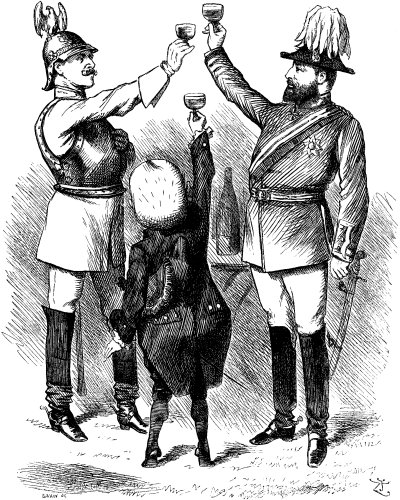
The Triple
Alliance:
Germany, Austria, and Italy |
| |
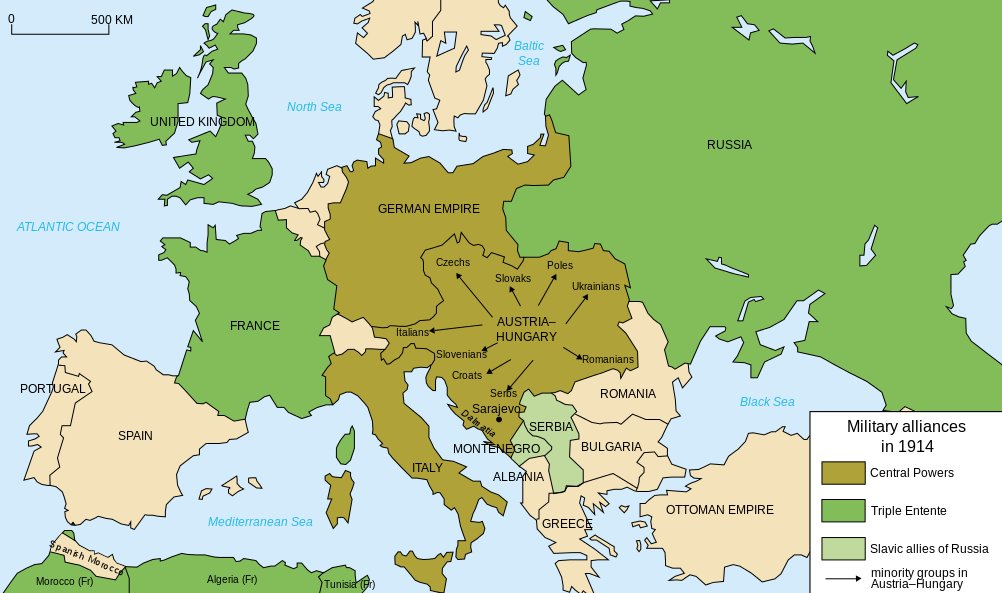 |
| |
|
So Who Was to Blame for World
War I? |
As it
turns out, I have a favorite
board game known as
Diplomacy.
Diplomacy is best
described as Risk
for big kids.
In
this game, each player
pretends to be one of the
seven major powers of Europe
at the turn of 1900.
Each player negotiate
treaties. What I like
about Diplomacy is that
"chance" does not play a
factor. The person
with the best negotiating
skills or the most evil
person always wins.
One
very unique feature of
Diplomacy is the
"Agreement" stage. In
this stage, each player
makes alliances and promises
to back his allies.
However, when each player
writes down their orders in
secret, they have the chance
to stab their partners in
the back and support a
different player instead.
So how
do I fare? Alas, I
finish second or third most
of the time. My
problem is that I am too
loyal by nature. It
turns out I have trouble
stabbing my allies in the
back.
I have
learned three things by
playing. First, the
easiest way to win is to
betray your allies at
certain key points.
Once you get the upper hand
through deception, it is too
late for them to retaliate.
Second, this game is a good
way to ruin friendships.
I recommend inviting people
you don't like.
Third,
and most interesting of all,
I have learned that Germany
and Austria never win (that
goes for Italy too).
It
turns out that because
Germany and Austria are
surrounded, Turkey, Russia
and France and England take
great delight in carving
them up.
So
which country usually wins?
England. That is
because England with its "Splendid
Isolation" is so
hard to attack.
Bismarck once
said that the United States and
Britain were the
two luckiest great powers on the planet.
America was protected by two
oceans and friendly,
non-aggressive neighbors.
Britain had the English
Channel to act as a giant
moat. Invasion by a
large army was a daunting
task.
Bismarck envied the United
States because Germany was
surrounded by enemies.
With Great Britain, France
and Russia as ongoing threats,
Bismarck understood that no
matter how powerful Germany
had become, it had enemies
on all sides.
Due to
my experience with
Diplomacy, on my
2016 Danube River cruise, I
decided once and for all to
figure out which country was
most responsible for
starting World War I.
It
turns out that assigning
blame for World War I has
been a favorite riddle for
historians for the past
century.
Germany caused World War I,
correct? After all,
that was what I was taught
in high school. I grew up
thinking the Germans started
the war. My 10th grad
history teacher told me that
Germany was a belligerent
nation that was always
looking to start another
war.
However, while doing my
research for this story, the
more I read, the more
confused I got on which
country carries
responsibility for World War
I. My early research
led me to feel a certain
sympathy for the tough
position Germany was in.
To begin with, one must take
into direct account the
German paranoia.
Germany believed everyone
was out to get them... and
it was true. Germany had few
friends. Germany had
pushed its weight around in
the latter half of the
previous century and
alienated practically the
entire continent.
France in particular still
nursed a grudge from its
1870 licking and was itching
to get even. Russia
was looking to flex its
muscles. Britain was
building up its navy in case
of a showdown.
The
loss of Bismarck in 1890
was a huge blow. It was the
loss of his leadership that put
Germany one step closer to a
perilous
war... a war which Bismarck not only
predicted, but had worked hard to
prevent.
To be
honest, I had long believed
Russia was the most
responsible.
The
1892 Franco-Russian
Entente sent a huge
bolt of fear into the German
high command. France
and Russia had just upset
the system of alliances
established by Bismarck to
protect Germany against a
potential “two-front”
threat.
German
General Helmuth von Moltke
immediately began to
war-game the plans for the
invasion of its dangerous
neighbors. Known as
the Schliefen Plan,
his strategy was based on
conducting a two-front war
using high-speed rail.
“Build
no more fortresses, build
railways,” von
Moltke said.
It was
a comforting thought for
Germany that Russia had a
poorly-developed rail
infrastructure. The
Tsar could not possibly
deploy his forces to the
German borders as fast as
the Kaiser could. The
Schlieffen Plan
plan called for the
destruction of France within
40 days followed by the
rapid transfer of troops to
meet the oncoming Russians.
That
is when the German high
command had a heart attack.
On the eve of World War I,
they discovered Russia was
building brand new railroads
right up to the German
border subsidized by French
money!! In addition
there were troops being
moved closer to the border.
An ominous sign indeed.
It was
this knowledge that
increased Germany's pressure
on an already jittery
trigger finger. If
Germany waited much longer,
Russia would be strong
enough to decimate German
defenses. This
knowledge explains Germany's
decision to rush to war when
the opportunity presented
itself.
To my
surprise, I discovered that
while the Germans had their
share of the blame, it was
easy to point the finger at
the Serbians, Austrians,
Russians, the French and the
British.
Let's
review the circumstances
leading up to World War I.
For Austria and Hungary, the
Balkan area was a
ticking time bomb. The
country known as Serbia
was pushing for
independence of all the
southern Slavic people from
the Austrian-Hungarian
Empire.
The
advantage of these alliances
was that it gave the Great
Powers a sense of security.
The downside was that if the
powers stuck blindly to
their alliances, then a
small-scale local dispute
involving one power might
drag the other powers in and
turn into a major war.
There
can be no doubt that all the
Great Powers were armed and
on alert. On the other
hand, the experience of the
early 1900s seemed to
suggest a wider war would
not happen. For
example, in 1905 and 1911,
there were heated disputes
between the Great Powers
over colonies in North
Africa, but no war.
Nevertheless, the tension in
Europe was so great that all
it might take was a spark.
The
Balkans had given previous
warning that the fire might
start there. The
Serbians had some new best
friends... the Russians.
The sleeping bear had
awakened. The Balkan
area was so unstable that
the Russians believed they
could extend their influence
into the area. So they
encouraged Serbia to foment
the unrest.
In
1908, Austria-Hungary took
over the province of Bosnia,
which contained many Serbs.
Serbia and her ally Russia
were furious, but there was
no war as a result. In
1912-13, there was another
series of wars in the
Balkans. Serbia emerged from
these wars as the main
victor and appeared to be a
possible threat to
Austria-Hungary. Even
so, there was still no major
war. Unfortunately,
this changed in 1914.
This time Serbia went too
far. The assassination
of Archduke Franz Ferdinand
was the trigger that set off
the Great War.
Austria was certain the
brutal assassination of the
Austrian crown prince was
done by a terrorist
organization sponsored by
the Serbian government.
Austria took the flagrant
assassination as an
insult that could
not be overlooked. If they
backed down from Serbia,
then there would be hell to pay with
all the other Balkan
countries.
There
was also a feeling that the
moral effects of military
action would breathe new
life into the exhausted
structures of the Habsburg
monarchy. Perhaps putting
Serbia in its place would restore to
Austria the vigor and virility of
a once glorious past.
Therefore, Serbia must be
dealt with harshly.
Only
one problem... Russia had
one million troops sitting
in Ukraine 500 miles away
with a fleet of Black Sea
ships prepared to carry them
to the area. The
moment Austria declared war
on Serbia, much to the alarm
of Austria and Germany,
Russia mobilized those
million soldiers.
This
was not a complete surprise.
Germany had known for some
time that Russia was
absolutely drooling over the
chance to fight.
Thanks to funds supplied by
its ally France, Russia had
recently built transport
railroads right up to the
German border. In
addition, Russia had egged
on Serbia to thumb its nose
at Austria to provoke
Austrian over-reaction.
Germany learned through its
spy network that Russia had
implemented mobilization.
The Germans assumed
correctly that
Russia's mobilization put
Germany in great danger.
Germany's attitude was that
it was better to have the
fight now before Russia got
any stronger.
The
moment Russia mobilized its
army ready to help the Serbs
against Austria-Hungary, the
alliances came into play.
Everyone knew that if Russia
attacked Austria-Hungary,
then the alliance system
meant that Germany and
France could be pulled into
the war as well.
On the
brink of war, Britain was
the Wild Card. In 1839
Great Britain had signed a
treaty to protect Belgium.
Given the German aggression
against Belgium, what should
it do?
Britain was often described
as being in 'Splendid
Isolation' from the
rest of Europe.
Britain had a huge empire
and ruling this empire was
its priority. The key to
Britain's power was India
with its vast resources of
manpower. Britain relied
heavily on Indian troops to
control the empire. The
highest priority for Britain
was protecting the trade
routes between Britain and
India. Britain's large navy
protected trade links with
India and with the rest of
the world.
Despite this focus on the
empire, Britain was
interested in events in
Europe. To start with, other
European countries had rival
empires. Belgium and France
both had large empires in
Africa. There was strong
rivalry between Britain and
France over possessions in
North Africa. By the early
1900s, Germany also had
colonies in Africa and was
beginning to show an
interest in North Africa.
Another concern was Russia.
For much of the 19th
century, Russia wanted to
take control of the
Dardanelles, the area where
the Black Sea opened out
into the Mediterranean Sea.
This would allow Russian
warships and trading ships
to sail easily around
Europe. Russia had
other ports in the north,
but these tended to freeze
over in winter. The problem
was that the Dardanelles
were owned by Turkey. Turkey
and Russia had long been
enemies. Britain supported
Turkey against Russia. This
was because Britain did not
want Russian ships in the
Mediterranean. The
Mediterranean was part of
Britain's most important
trade route to India.
Until
the early 1900s,
relations between Britain
and Germany were very good.
Britain was far more
concerned about Russia and
France than Germany.
Although the rise of Germany
in both industrial and
military terms alarmed
Britain, the British
policy makers correctly
ascertained that Bismarck
intended to keep Germany a
status quo power.
This
benign attitude changed
quickly when Kaiser Wilhelm
II, ironically the grandson
of Britain's Queen Victoria,
took control of Germany.
Crowned in 1888, Wilhelm II
dismissed Chancellor Otto
von Bismarck in 1890.
He then launched Germany on
a bellicose "New Course" in
foreign affairs
Wilhelm was anxious for
Germany to be a great power.
He felt that Russia to the
east and France to the west
were encircling Germany. As
a result, he built up his
armed forces forcing France,
Britain and Russia to do the
same.
British policy in Europe
intended that no country in
Europe should become
completely dominant. If
Russia, France, Germany and
Austria-Hungary worried
about each other, then they
would be less of a threat to
Britain. By about 1907
it was becoming clear to
Britain that the greatest
potential threat to Britain
was going to be Germany.
Once
the Russians had mobilized,
the Germans weren't going to
wait. The
Schlieffen Plan
called for the Germans to
attack France through the
poorly defended plains of
Belgium, a neutral country.
On August 3, 1914, the first
wave of German troops
assembled on the frontier of
neutral Belgium. The
day before, Germany had
presented King Albert, Belgium's
sovereign, with
an ultimatum demanding
unrestricted passage for the German army
through its territory.
King
Albert contacted Britain and
made a concerted appeal for
help. Now Prime
Minister Herbert Asquith had
a tough decision to make.
Asquith
could turn a blind eye to
war in mainland Europe.
If he did so, the war would stay
limited and have little
impact on Britain if she
stood as a neutral. Countless
British lives would be
saved.
Or
Asquith could resist the
perceived bullying of
Germany and stand up for
righteousness and decency.
If so, he risked a
cataclysmic death toll on
the youth on
Britain. What
to do?
Asquith gave Germany an
ultimatum to back away from
Belgium by midnight 'or
else'.
The
Germans had miscalculated
British intentions.
They knew full well this
wasn't Britain's fight so they
fully expected Great Britain
would sit this one out.
They were wrong. The
furious German ambassador
to Britain referred to
the 75-year old Treaty between Britain
and Belgium as insanity.
Why go to war over a mere “scrap
of paper”?
Angered by Britain's demand
to back off, the
Germans ignored Asquith's
ultimatum and continued the
push toward France.
Soon
after, Britain entered the
war. The Great War was on.
So who was to blame?
Having
studied the story, my vote
was on Russia. One
scholar said it best:
"The resulting
war, with France backing
Russia and Russia
backing Serbia and
Britain backing everyone
against the two Central
Powers, was Russia's
fondest dream come true."
That
is when I learned a very
interesting lesson... the
more I know, the less I
know. It turns out
that my first hunch was
correct to some extent, but
wrong. The moment I
stumbled on another article,
that is when my eyes really
opened.
In a
very entertaining article
titled
Ten Interpretations of
Who Started World War I,
on the hundred anniversary
of the war, the BBC asked
ten prominent English and
German international
historians who they assigned
the blame to.
The
consensus laid most of the
guilt at Germany's feet.
Here were the votes:
-
Germany
-
Serbia
-
Austria-Hungary, Germany
and Russia
-
Austria-Hungary and
Germany
-
Austria-Hungary,
Germany, Russia, France,
Britain and Serbia
-
Austria-Hungary and
Germany
-
Austria-Hungary,
Germany, Russia, France,
Britain and Serbia
-
Austria-Hungary and
Germany
-
Austria-Hungary and
Germany
-
Germany
As one
can see, Germany was cited
by 9 of the 10 professors
including the German
writers. My
favorite explanation was
written by John Rohl,
professor emeritus of
history, University of
Sussex. He identified
Austria-Hungary and Germany
as the main culprits.
WW1 did not break out by
accident or because
diplomacy failed. It
broke out as the result
of a conspiracy between
the governments of
imperial Germany and
Austria-Hungary to bring
about war, albeit in the
hope that Britain would
stay out.
After 25 years of
domination by Kaiser
Wilhelm II with his
angry, autocratic and
militaristic
personality, his belief
in the clairvoyance of
all crowned heads, his
disdain for diplomats
and his conviction that
his Germanic God had
predestined him to lead
his country to
greatness, the 20 or so
men he had appointed to
decide the policy of the
Reich opted for war in
1914 in what they deemed
to be favorable
circumstances.
Germany's military and
naval leaders, the
predominant influence at
court, shared a
devil-may-care
militarism that held war
to be inevitable, time
to be running out, and -
like their Austrian
counterparts - believed
it would be better to go
down fighting than to go
on tolerating what they
regarded as the
humiliating status quo.
In the spring of 1914,
this small group of men
in Berlin decided to
make "the leap into the
dark" which they knew
their support for an
Austrian attack on
Serbia would almost
certainly entail.
The German and Austrian
leaders took criminal
risks with world peace.
Besides Germany, the biggest
loser of the war was Russia. One
can only wonder why
Russia was so eager to fight
Germany at the start of the
war. At the start of
the war, only half their
troops had a rifle of their
own.
Russia sent waves of
helpless farmers brandishing
pitchforks up against German
machine guns. It was a
horrible slaughter as the
Germans decimated the
Russian troops. Russia
not only lost nearly 2
million men, an amazing
total.
Of
course this absurd death
toll had its consequences.
The Bolsheviks
took advantage of the
intense dissatisfaction and
misery
in their country to start
the 1917 Russian Revolution. Once
the Czar of Russia was
executed, the Bolsheviks
turned around and begged Germany for peace.
This
cost Russia
vast amounts of territory.
After the 1918 cease fire
agreement between Germany
and Russia, Germany took possession
of Russian territory in
Poland, Finland, Estonia,
Latvia, Belarus, Ukraine and
Lithuania.
However, Russia wasn't the
only big loser. After
Germany surrendered, Germany
lost its Empire and huge
chunks of territory.
Austria lost its Empire and
huge chunks of territory.
Poor
Hungary was literally ripped
to shreds. Both
Hungary and Austria paid
dearly for joining
Bismarck's defensive
alliance.
We now know
that the punitive conditions
imposed upon the losers were
so harsh that the seeds of
discord had been
laid for World War II.
Adolf Hitler would soon skillfully
exploit the deep-seated
resentment and thirst for
revenge to create World War
II.
Where
was Bismarck when Germany
needed him?
|
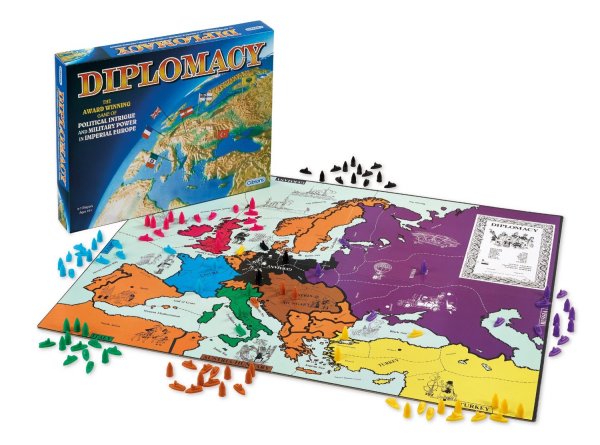
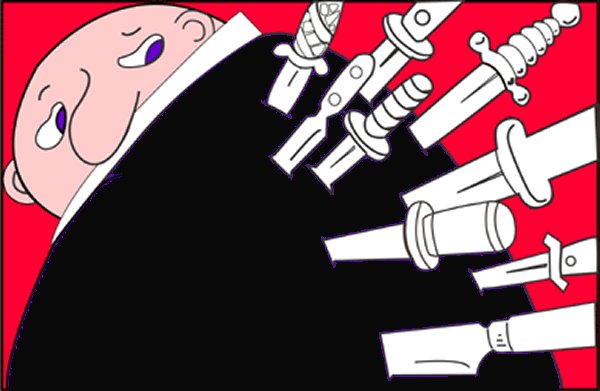
Betrayal is the name of the game
in Diplomacy
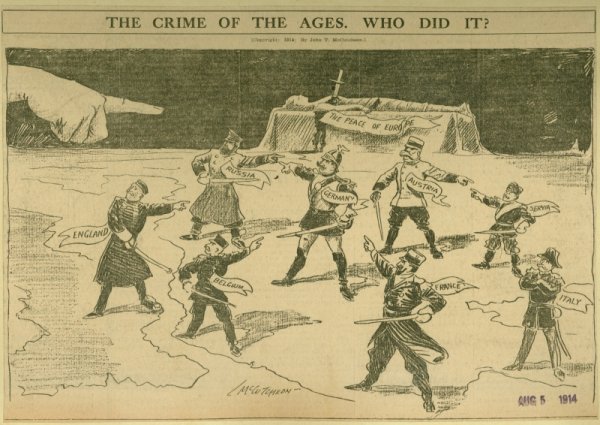
Who
do you think was most to blame??
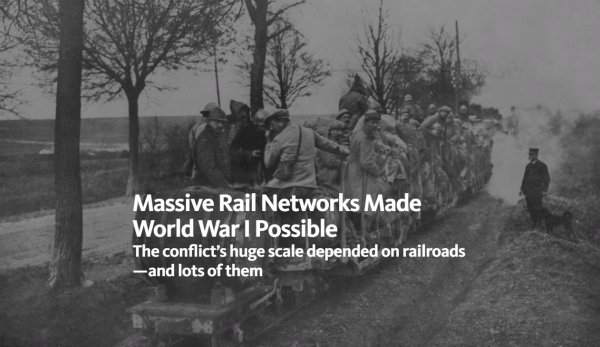
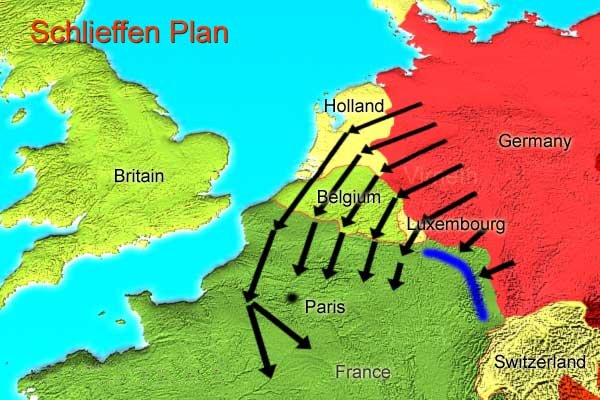
The French had built an
impressive defense along its
shared border with Germany.
So the Germans used Belgium
instead.
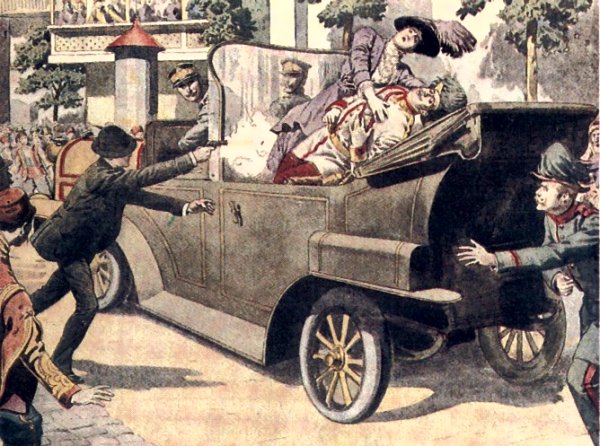
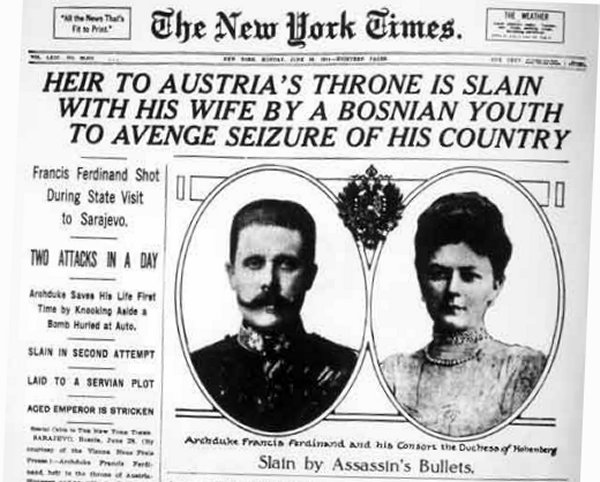
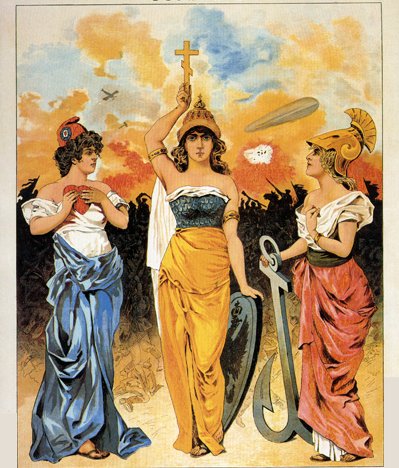
This
is a very interesting
Russian Poster titled 'Agreement'.
It
shows a very determined
Russian woman bent on
fighting the war going on
behind her with France
(heart) and England (anchor)
looking on skeptically.
England and France were not
at all enthusiastic about
this war.
Russia
went to great lengths to
cause WW I, yet ironically
was forced to drop out to
fight its civil war
following the 1917 Russian
Revolution.
Now that
Germany had only one front
to worry about, Germany
almost won the war. It
took the last-minute
entrance of the USA into the
fight to save the day.
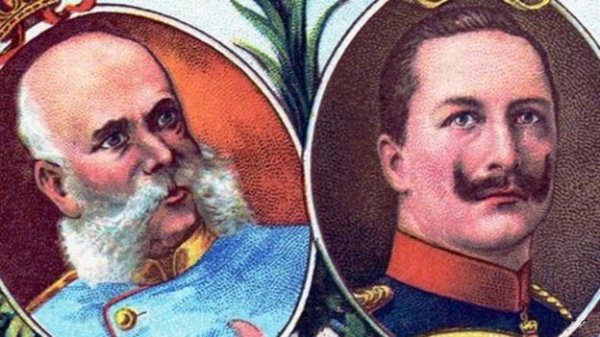
Austrian
Emperor Franz Joseph I and
Germany's Kaiser Wilhelm II
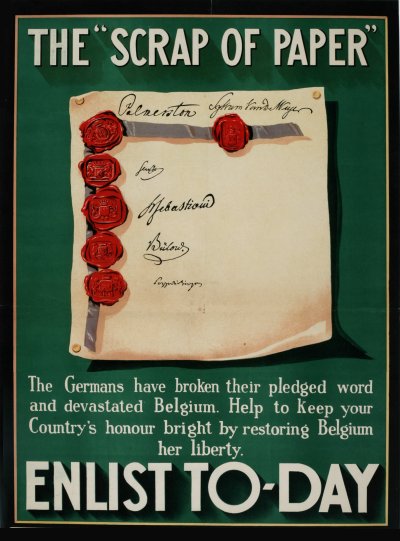
The German ambassador was
full of contempt when the
British Prime Minister
informed him that Britain
would go to war if the
Germans did not back off.
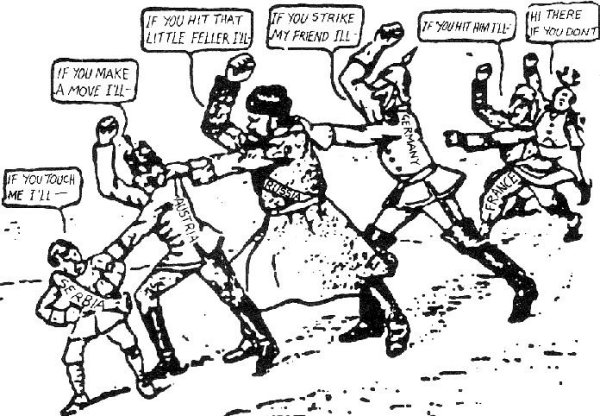
The
assassination of Austria's Francis
Ferdinand
set off an amazing chain
reaction
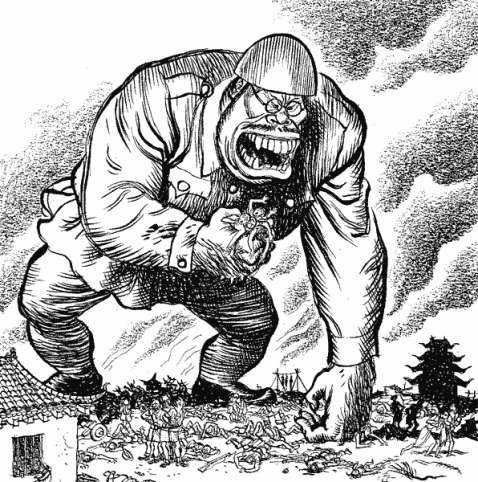
The
consensus was that Germany was
to blame
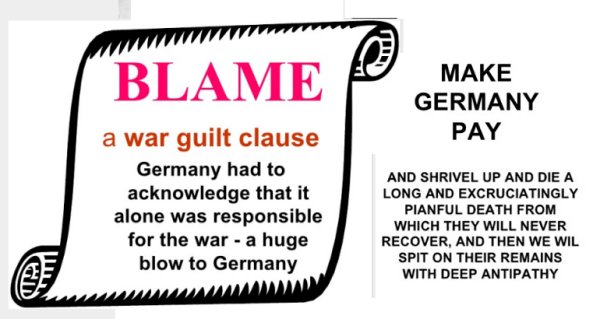
At
the 1919 Treaty of Versailles,
the wrath of Europe was
unleashed upon Germany.
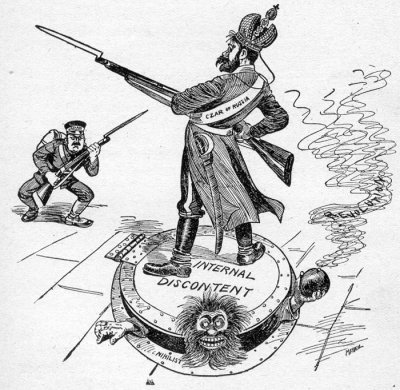
Russia paid a heavy price for
its role in World War I
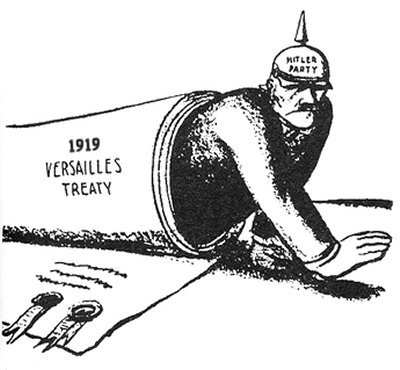
The
harsh conditions imposed upon
Germany following
World War I created world-wide
depression. The
overwhelming resentment felt by
the German people opened the
door for Hitler
|
|
|
|
 |
| |
|
As I
have said earlier, my visits to Europe have allowed me to
visit remote areas and learn about the history of
the region.
Before
the Danube cruise, one area
of the world that I knew virtually nothing about is
the Balkan region north of Greece and south of
Hungary. This trip helped me figure it
all out.
I am now
thoroughly convinced that Hungary has probably
suffered more than any other country in Europe.
For one
thing, this Danube River Cruise allowed me to better
understand what caused World War I. Until this
trip, I never quite understood why the assassination
of an Austrian prince on a visit to Serbia would
cause an entire world war. Indeed, twenty different
countries participated the Great War including Japan
and Siam. Japan? Siam? Good grief.
Unfortunately, I don't always like what I see on
these trips.
On the
2015 Rhine trip, the guides hinted at the World War
II struggles between France and Germany, but it was
mostly in passing. Not so on the 2016 Danube
trip. On this trip, I learned quite a bit
about Ottoman (Muslim) atrocities, German
atrocities, and Russian atrocities. Trust me,
it wasn't pleasant.
A major
feature of this visit was the chance to understand
just how powerful Religion has been in shaping
European history. For centuries, Europe has
been the battleground for an unbelievable amount of
bloodshed based on religion. Fighting for
God... it doesn't really make a lot of sense, does
it?
I knew
of the brutal battles between the Catholics and the
Protestants, but what I did not know about is that
the Muslims were in on the battles as well. I had no
idea the extent of the Muslim influence in the
Balkan region of the world until this trip.
Apparently the Muslims were pretty ruthless. For
example, one of the Ottoman subjugators of Hungary
was Sultan Mehmed III.
Taking a page out of the Josef Stalin playbook,
Mehmed III was notorious for having nineteen of his
brothers and half-brothers executed to secure power.
If a man would do that to his own family, one can
only imagine what he did to his enemies.
I knew
about the Crusades, but I thought those battles took
place in the Holy Land. I did not realize the
Muslim invasion made it all the way to Vienna and
Budapest several times.
Austria
was able to repel the Muslims, but Hungary was less
fortunate. The Ottomans achieved a decisive victory
over the Hungarian army at the Battle of
Mohács in 1526. Following its defeat,
the southern part of Hungary would languish
under Ottoman rule for 150 years while the northern
half belonged to Habsburgs of Austria.
During
my visit to Budapest, I noticed the Ottoman influence is
still there. For example, I had the chance to visit
Matthias Church in Budapest. I was
curious why this church lacked the charm I had seen
in similar churches during this visit.
My guide
informed me that the Muslims had come in and painted
everything white. All the painstaking detail inside
the church was lost. What I was seeing now was a
rather mediocre job of restoring the cathedral after
they kicked the Muslims out.
This
story was my introduction to the dark past of
Hungary. If ever there was a nation with a
hard-luck story, it has to be Hungary.
Back in
college, I had a professor who said, "The major
problem with Revolution is that typically all you
accomplish is to change the boot on the back of your
neck."
In the
case of Hungary, no words were ever more true. In
order to rid Hungary of the Muslims, around 1700 the
Habsburgs put together an army strong enough to kick
the Ottomans out of Hunagary. The next thing they knew, now Austria
had its boot on Hungary's neck. Hungary was
now under Austrian rule.
Hungary
and Austria enjoyed an uneasy peace for the next
century. However, things changed at the start
of 1800. That is when Napoleon came knocking.
Napoleon took special delight in bringing
once proud Austria to its knees. The Austrians
were serious gluttons for punishment. Four
different times they challenged Napoleon and four
times Napoleon emerged victorious. In 1809, as
terms of victory, for good measure, Napoleon
demanded the hand of an Austrian princess.
Just like that, Napoleon had a wife. Napoleon
was royalty now.
After
Napoleon, Hungary tried very hard to free itself
from Austria. In the failed Hungarian
Revolution of 1848, the Magyars came close
to regaining independence. Hungary was
defeated by the Austrian Empire only with the aid of
the Russian Empire.
In 1866,
the Prussians humiliated Austria in the Seven
Weeks War. Austria would never be the
same. One year later in 1867 Austria offered
to elevate Hungary to equal status. It was
either that or lose Hungary completely.
Hungary accepted the opportunity to become a
Dual Monarchy. This was the start of
the Austro-Hungarian Empire. It was a
good move for both nations as it created prosperity
for the next decade.
Then
came the alliance with Germany in 1879. Big
mistake. Now Hungary's fortunes were tied to
Germany. At the time, the move made sense.
As long as Bismarck was calling the shots, Austria
and Hungary could have no better ally.
But when
Kaiser Wilhelm II took over in 1890 and fired
Bismarck, Austria-Hungary was in trouble. If
ever there was a loose cannon, that would be the
imperialist Kaiser Wilhelm.
Keep in
mind that it was the Austrian Crown
Prince that was assassinated in Serbia in 1914, not
the Hungarian Prince.
Unfortunately, with Hungary's fortunes tied to
Austria's fortunes tied to Germany's fortunes,
Hungary was reluctantly sucked into World War I on
the side of Austria and Germany.
We all know how that turned out.
The
signing of the Treaty of Versailles on
28 June 1919, officially ended the war. The
subsequent 1920 Treaty of Trianon was
greatest catastrophe to ever fall on Hungary. Hungary
got complete independence, but at a price more
severe than any other nation.
Hungary, founded in 896, was a peaceful
multi-ethnic state for over 1100 years with borders
that were virtually unchanged. For some strange
reason, in 1920 Hungary was mysteriously decimated
by the Allies.
A
thousand years of nation building based on culture,
religion, geography, and other attributes were
dissolved in a flash. No one can explain why
Hungary was punished so severely.
The
Treaty of Trianon in 1920 was extremely
harsh on Hungary. The Treaty cost Hungary an
unprecedented two-thirds of her territory and
two-thirds of her total population.
Compared
with the former Kingdom of Hungary, the population
of post-Trianon Hungary was reduced
from 20.8 million to 7 million and its land area
decreased by 72%. Adding insult to
injury, Hungary lost all of her seaports.
Millions
of Hungarians saw borders arbitrarily redrawn around
them, without plebiscites, ignoring President
Wilson's lofty goal of national self-determination.
The absurd treaty created a millennium of social
unrest that led directly to World War II and the
ethnic cleansing in the Balkan area during the
1990s.
So why
did Hungary participate on the German side during
World War II? Good question.
Hungary
was an independent nation that was no longer
beholden to Austria. Unfortunately, the Great
Depression in the 1930s saw Hungary suffer greatly.
The Kingdom of Hungary became economically dependent
on increased trade with Fascist Italy and Nazi
Germany to pull itself out of the Great Depression.
Germany
preceded World War II by annexing its neighbors -
Austria, Poland, and Czechoslovakia. However
Hungary was just slightly out of Germany's reach and
declared itself neutral.
Germany
did not threaten to use force to bring Hungary under
its umbrella. Germany was on friendly enough
terms with Hungary. Therefore the Nazis did
not wish to invade Hungary, but rather "persuade" it
to become its ally. Germany could be
very persuasive. If Hungary would collaborate
with Germany, Hitler promised to restore to Hungary
the gigantic slices of territory lost in the 1920
Treaty of Trianon.
Amazingly, Hungary still refused to ally with
Germany. Moreover, Hungary protected the
massive influx of Polish Jews that streamed into
Hungary. However, Germany refused to take no
for an answer. Germany kept up the pressure on
Hungary to participate for three years.
In 1941,
Germany decided the time had come to attack
Yugoslavia on Hungary's southern border.
Germany asked permission to send its troops through
Hungary. Hungarian Prime Minister Pal
Teleki said no. Teleki had signed a
non-aggression "Treaty of Eternal Friendship" with
Yugoslavia only five months earlier. Teleki
would not assent to assist the invasion.
Teleki's
enduring desire was to keep Hungary non-aligned, yet
it could not ignore Nazi Germany's dominant
influence. Teleki was now faced with two bad
choices. He could continue to resist Germany's
demands for their help in the invasion of
Yugoslavia, although he knew this would likely mean
that after Germany conquered Yugoslavia, it would
next turn its attention to Hungary—a repeat of what
had happened to Austria, Czechoslovakia and Poland.
Or he could allow German troops to cross Hungarian
territory, even though this would betray Yugoslavia
and lead the Allies to declare war on Hungary.
The
decision was made for him... without Teleki's
knowledge, the Hungarian minister of defense wired
permission to Germany. When Teleki found out
that German troops had just crossed Hungary's
borders on the way to Yugoslavia, he shot himself in
the head.
Things
did not go well for Hungary during World War II.
The Hungarians hated the Germans before
World War II even started. The
longer the war continued, the more Hungary despised
Germany!!
Hungarian officials became so
appalled at Nazi atrocities that the leaders began
to seriously think about changing sides in 1944.
Unfortunately, Hitler got wind
of cease-fire talks between Hungary and the Allies.
Hitler wanted to prevent Hungary from
following the example of Italy and deserting the war
effort.
He quickly dispatched German forces to occupy
Budapest.
Now the
boot on the neck changed again. Basically
Hungary had just been subjugated by Germany.
Furthermore, Hungary's Jews
were in serious trouble. They would soon
discover Nazi Germany was barbaric when it came to
Jews.
|
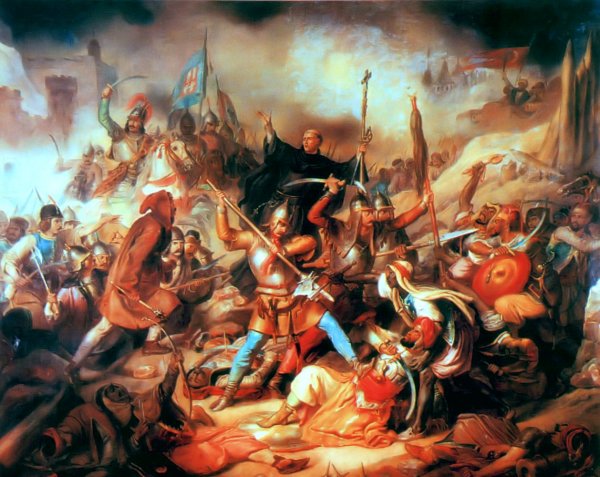
The Ottoman Invasion of Hungary
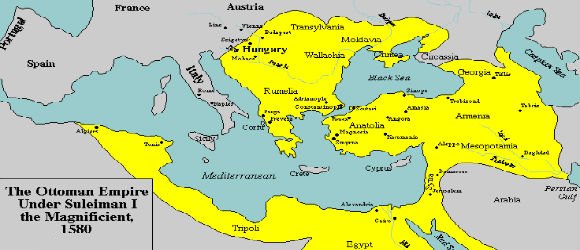
The Ottoman Empire included Hungary for 150
years
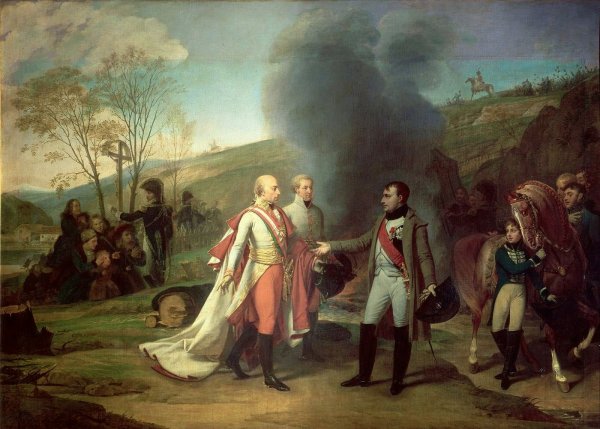
Napoleon accepts the
surrender of Austrian Emperor Ferdinand I after
the 1809 Battle of Wagram
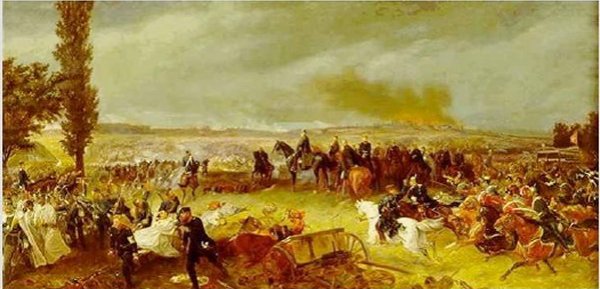
Prussia annihilated
Austria in the Seven Weeks War in 1866.
This defeat marked the end of Austria as a
first-tier world power.
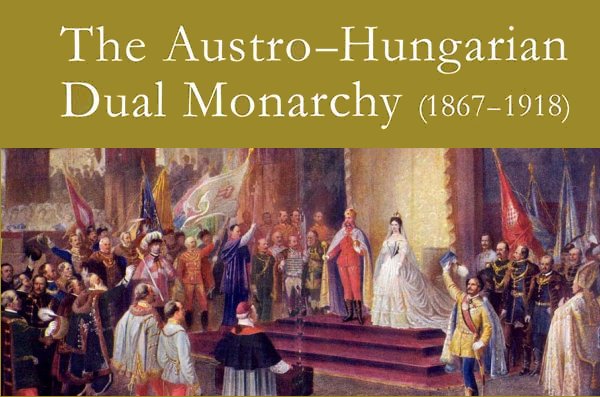
Following Austria's
1866 defeat at the hands of Prussia,
in 1867 Austria offered to make Hungary a
co-partner.
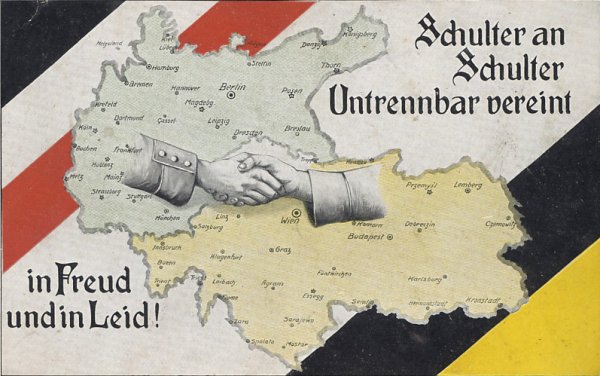
"Shoulder to shoulder inseparably united... in
and in song"
In 1879, Bismarck persuaded Austria and Hungary
to join the
Triple Alliance. This alliance
obligated Hungary to participate with Germany
and Austria in World War I
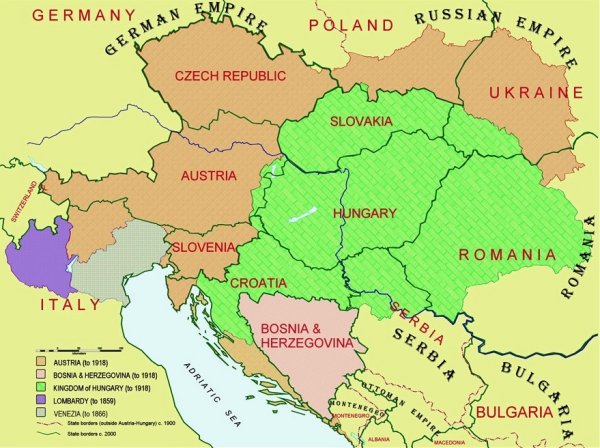
Here is Hungary at the start of World War I.
Hungary would lose 72% of its territory after
being defeated.
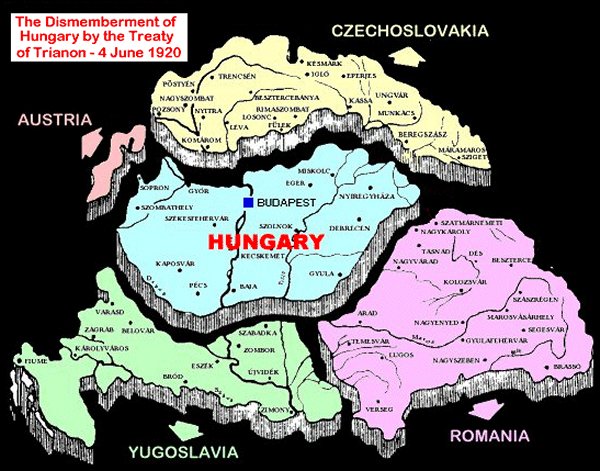
Here is Hungary at the end of World War I.
No one can explain why Hungary was treated so
harshly.
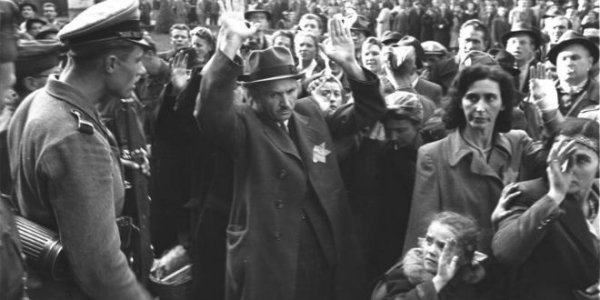 |
| |
|
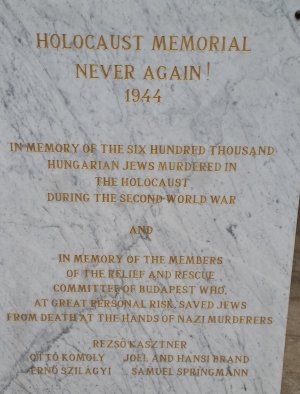 |
Hungary had long been a haven for Jewish
people. Indeed, the contributions of
the Jews to business, education and the arts
had long helped make Hungary one of Europe'
points of light. Up to this point, the
Jews had been oppressed
by anti-Jewish
legislation, but
the majority of Hungary's Jewish community
lived in relative security.
In the meantime,
throughout occupied Europe, the
Holocaust was already in full swing.
SS mobile extermination units swept
through the eastern territories, death- and
forced labor camps were operating and the
Jewish communities of Europe were
being destroyed
one after the other...
all except for the Hungarian Jews.
Then came March 1944.
That is when the Nazis moved into Budapest.
The Germans were just as ruthless as the
Muslims had once been, probably worse. The
Germans quickly made up for lost time.
Quickly many of the Jewish citizens were
rounded up and sent to concentration camps.
The remaining citizens were forced into a
ghetto in Budapest. Every day the
Nazis would come to round up more Jews and
put them on a train to Auschwitz.
At least 400,000 Hungarian Jews were
eventually murdered by the Nazis, quite
possibly many more.
|
| |
|
Sometimes there were just too many Jews.
Why bother sending them to a concentration
camp? The storm troopers found another
way. In order to save ammunition, a favorite
trick was to tie 15 Jews together and make
them take off their shoes.
Then they would shoot one in the head and
push all the rest into the freezing Danube
River. The Nazis would laugh as the
victims screamed in horror. It had to be oh
so terribly amusing to watch these helpless,
miserable people die agonizing deaths from
drowning and freezing.
The story of Budapest at the end of World
War II left me completely mind-boggled.
During World War II, Hungary was mainly
responsible for fighting the Soviet Union.
Hungary lost at least 200,000 men in the
process.
Towards the end of the war, Stalin was about
to meet with Roosevelt and Churchill. Stalin
decided the conquest of Budapest would
increase both his stature and bargaining
position, so he ordered his commander to
conquer Budapest at all costs.
This
led to intense fighting that lasted over 50
days. It was an incredible battle fought
right on the Danube River in Budapest. The
Hungarians and Nazis resisted the Russian
advance as best they could. However, the
Russians outnumbered the defenders 2 to 1.
Given Stalin's orders to take the city at
all costs, the Russians came in wave after
wave till ultimately they prevailed.
The Germans were so angry over their defeat
that a furious General sent some soldiers
over to the Jewish synagogue. On the spot,
the Germans gunned down 250 defenseless Jews
right there in the courtyard just out of
spite. Then the Germans fled the city in a
mad every man for himself dash.
During the brutal fighting, both sides lost
countless numbers of soldiers. The Russians
claimed losses above 100,000. The combined
German and Hungarian forces lost
40,000-50,000 men.
For weeks afterward, bloated bodies piled up
against the destroyed bridges in the Danube.
This led to a terrible joke... the Blue
Danube was now the Bloody Red Danube.
|
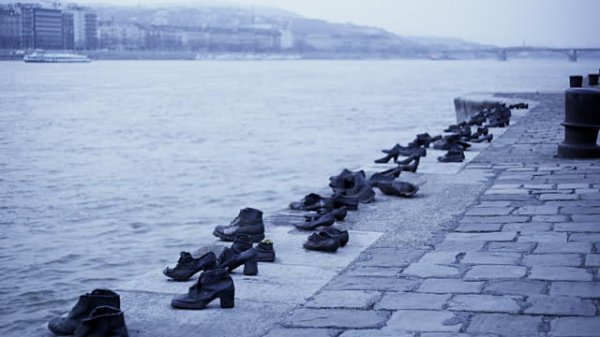
This row of shoes along the Danube in Budapest
serves as a
heart-rending memorial to German atrocity
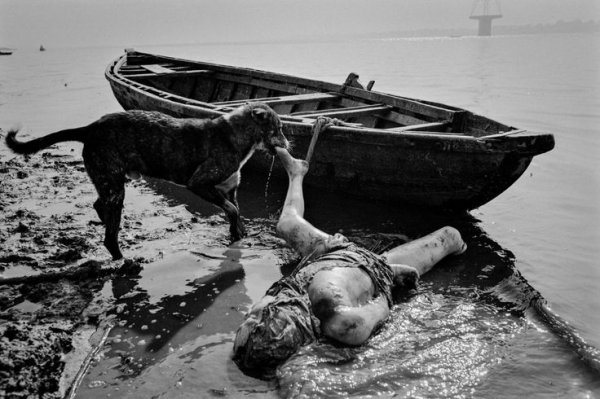
A hungry dog pulls a
corpse out of the Danube |
| |
|
And get this... the City of Budapest lost
38,000 citizens as well!! Plus the city was
practically leveled to the ground in the
process.
When the Soviets finally claimed victory,
they initiated an orgy of violence. This
included the wholesale theft of anything
they could lay their hands on and random
executions. Then came the mass rape. An
estimated 50,000 women and girls were raped.
Hungarian girls were kidnapped and taken to
Red Army quarters, where they were
imprisoned, repeatedly raped and sometimes
murdered.
As if this wasn't enough, for good measure,
half a million Hungarians were taken as
prisoners to the Soviet Union to work as
slaves in their mines and factories.
This began the Russian occupation of
Budapest. The Hungarians didn't quite know
what to make of the Russians. Hungary hated
the Nazis so much that many citizens were
secretly happy when the Russians arrived to
liberate them from Nazi tyranny in 1945. But
then on the other hand, it didn't take long
to begin despising the Russians as well.
There was one irony that I never quite
figured out. Atop Gellert Hill in the
center of the city, in 1947 a magnificent
statue was erected right where the fiercest
fighting had taken place. They called it
"The Liberty Statue".
This impressive statue was prominent in the
same way that the Eiffel Tower is prominent
in Paris. Situated atop that hill, the
Liberty Statue could be seen from a hundred
miles away with a good telescope.
My guide said this statue was erected by the
people of Budapest out of gratitude to the
Russians for 'liberating' Budapest from the
Nazis. The Liberty Statue was
dedicated it to the brave Russian soldiers
who had defeated the hated Germans.
What a relief to get rid of the hated
Nazis!!
To me, this majestic statue made no sense.
After the destruction of the city, the
murder of 38,000 citizens, the rape of
50,000 women, and the abduction of a half
million Hungarians, why on earth would
Budapest feel an ounce of 'Gratitude' to the
Soviets?
Perhaps someone can explain it to me. Why
would the citizens of a conquered city erect
a statue thanking these barbarians who had
pillaged their city?
|
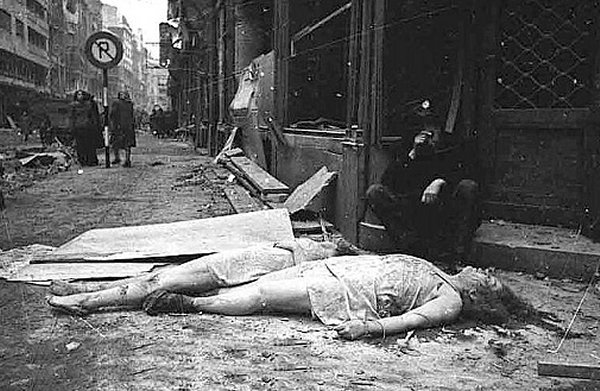
The Rape of Budapest
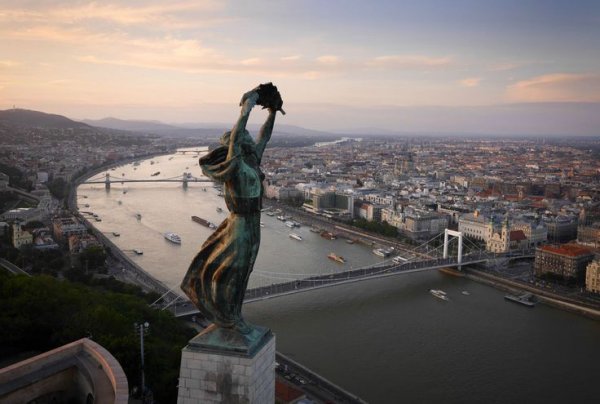
Liberty Statue on
Gellert Hill rising above Budapest |
| |
 |
| |
Perhaps what the Hungarians did not realize
at the time was that they had simply
exchanged the Nazi boot on their neck for
the Communist boot.
Hungary had just fallen on the Dark Side of
the Iron Curtain. Once the Soviets took
over, they dominated Hungary with
practically the same ruthlessness as the
Germans. Communism robbed Hungary of
its spirit just when its citizens thought
they were finally free.
In 1956, Hungary staged a peaceful march
asking for more freedom. Russian troops took
to the streets and murdered countless
unarmed demonstrators. Now the Hungarians
decided to fight back. Bad move. The USSR
sent in the tanks and put down the resulting
rebellion with ruthless efficiency.
It was not until 1989 that Hungary finally
enjoyed true independence for the first time
in over 500 years.
I was overwhelmed to learn the facts of this
neverending story of Hungarian subjugation
and suffering.
|
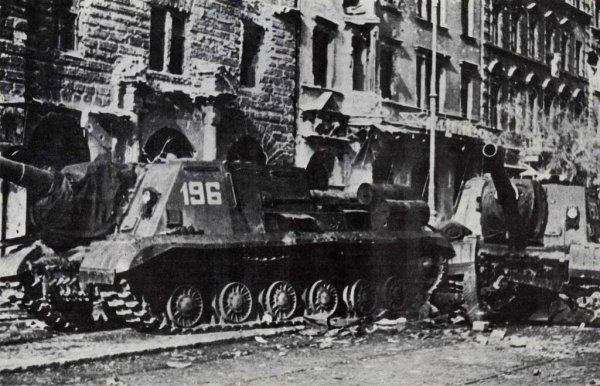
Soviet tanks sent to Budapest to quell the
uprising |
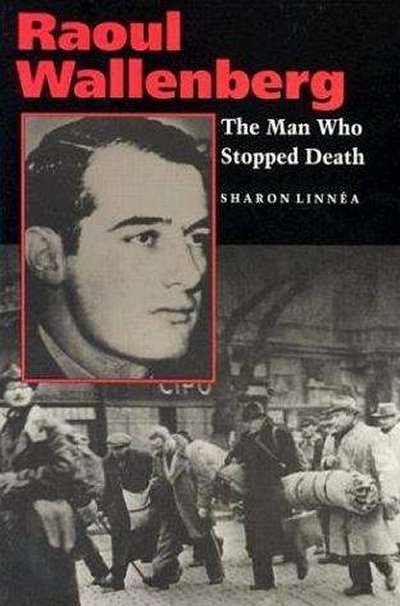
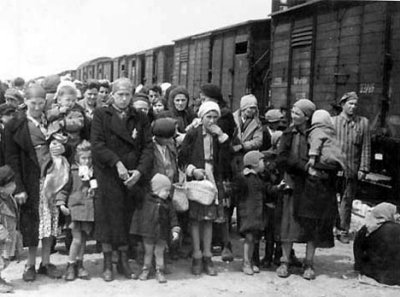
Deportation of Hungarian Jews
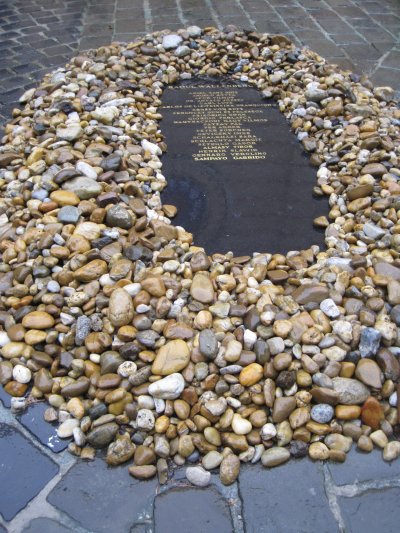 |
During my trip, I learned the story of a
hero I had never heard of before. I would
like to share the story of a Swedish man
named Raoul Wallenberg.
In a manner similar to Oskar Schindler (Schindler's
List), Wallenberg worked
relentlessly to save Jewish lives.
After the Nazi takeover in 1944, the
citizens of Budapest were horrified to see
what the Nazis were doing to the Jewish
population. Many of the citizens tried to
help in whatever way they could. Raoul
Wallenberg was the bravest of all.
In cooperation with the Swedish embassy,
Wallenberg rented 32 buildings in Budapest
and declared them to be 'extraterritorial'.
This meant the buildings were protected by
diplomatic immunity. He put up signs such as
"The Swedish Library" and "The Swedish
Research Institute" on their doors and hung
oversized Swedish flags on the front of the
buildings to bolster the deception.
At one point, the Swedish buildings housed
almost 10,000 people.
Wallenberg displayed considerable personal
courage on several occasions. Here is
one remarkable story told about him.
Sandor Ardai was one of the drivers who
worked for Wallenberg. Ardai recounted
what Wallenberg did one day when he
intercepted a trainload of Jews about to
leave for Auschwitz:
Raoul Wallenberg climbed up on the roof
of the train and began handing in
protective passes through the doors
which were not yet sealed. He ignored
orders from the German Arrow Cross Guard
for him to get down. When Wallenberg
failed to cooperate, the Arrow Cross
Guard began shooting and shouting at him
to go away.
Wallenberg ignored them and calmly
continued handing out passports to the
hands that were reaching out for them.
The Arrow Cross men deliberately aimed
over Wallenberg's head.
Not one shot hit him.
To miss with so many shots would have
been impossible. Most likely the
Germans did this because they were so
impressed by his courage.
After Wallenberg had handed over the
last of the passports, he ordered all
those who had one to leave the train and
walk to the caravan of cars parked
nearby, all marked in Swedish colors.
Wallenberg saved dozens off that train.
Meanwhile the Germans and the Arrow
Cross were so dumbfounded they let him
get away with it.
Here is another story about Raoul
Wallenberg.
In the second week of January 1945,
Raoul Wallenberg found out that Adolf
Eichmann planned a massacre of the
largest Jewish ghetto in Budapest. The
only person who could stop it was the
General Gerhard Schmidhuber. As the
commander of the German troops in
Hungary, Schmidhuber was given the
responsibility to carry the massacre
out.
Wallenberg sent Schmidhuber a note. The
note promised that he, Raoul Wallenberg,
would make sure the General was held
personally responsible for the massacre
and that Schmidhuber would be hanged as
a war criminal when the war was over.
Schmidhuber knew that the war would be
over soon and that the Germans were
losing. The massacre was stopped at the
last minute thanks to the courage and
daring action of Wallenberg.
And what was Wallenberg's reward?
At the end of the war, Wallenberg was
kidnapped by Soviet police. Wallenberg was
never seen again. It is very likely that
Wallenberg was either executed or died in a
Russian prison. Oddly enough, Wallenberg
wasn't even Jewish. He just couldn't bear to
let innocent people die without doing
something.
I was astonished to learn the extent of
Raoul Wallenberg's bravery.
It was a great honor to add a rock to the
pile next to Mr. Wallenberg's memorial at
the Budapest Synagogue. Trust me, I
had large crocodile tears in my eyes.
|
I do not know if Americans truly realize how
lucky we are.
The first miracle of life is to be lucky
enough to born here in America. The
odds are about 1 in 30.
The second miracle of life is to be given
the chance to receive a quality education.
Not only does education open our eyes, it
gives us an incalculable advantage over our
counterparts.
One of our guides made a very controversial
statement about education. In her opinion,
the turning point in Western civilization
came when the Christians and the Jews began
to emphasize education over religion.
Meanwhile countless Muslim children were
being hindered by the amount of time spent
learning Arabic and Islamic theology.
I could not agree more that Education is the
bedrock of civilization. Education is what
lifted Europe out of the darkness and it is
what keeps America strong.
Well-informed minds make better decisions
and innovations.
I might add that 'Travel' is a
form of education in its own right. They say
that Travel is fatal to Bigotry. I believe
this statement is true. Wherever my travels
with Marla take me, I am struck by the fact
that we are all the same. We all want peace.
We all want security. We all want to raise
our children without fear.
At the start of my trip, the story was the
unbelievable beauty of the Danube River and
the lands that it touches. Then I was
impressed by the splendor of modern
Budapest. Budapest is a truly beautiful
city. I put it right up there beside Paris,
Barcelona, and Rome as my four favorite
cities to date.
However, underneath the shining veneer of
progress, I saw evidence of fear... fear of
terrorism, fear of migration, fear of
renewed Russian domination.
Unfortunately all it takes is a few monsters
to make life miserable for us all. If anyone
would understand the fear of domination by
outside forces, it would be the citizens of
Hungary.
I can see now why people love America so
much in this part of the world.
America is a mighty country that seeks to
use its power for good, not evil.
I am not saying our leaders always use their
power wisely, but at least our nation is
trusted not to seek world domination.
Our friends do not fear the United States.
After what a place like Hungary has been
through, that is quite a relief.
This river cruise to Austria and Hungary got
me in touch with the true meaning of freedom
in a way that history books will never
accomplish. The story of the human race is
the story of every man's struggle for
independence.
Here in America, we are unbelievably blessed
to have so much freedom. We truly are the
Land of the Free. However, I worry that many
of us take this freedom for granted because
we have never suffered.
America is a living symbol for hope among
oppressed people. That is the message I took
away from this trip.
|

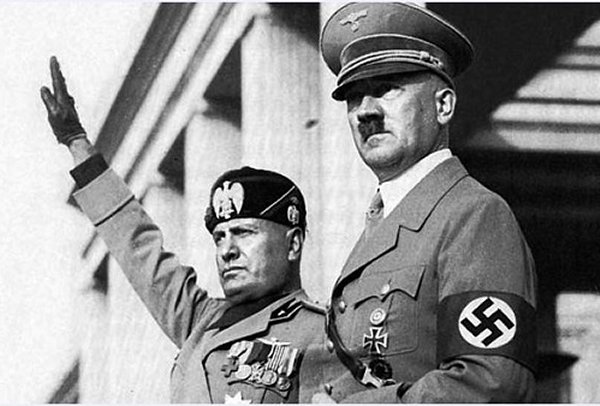
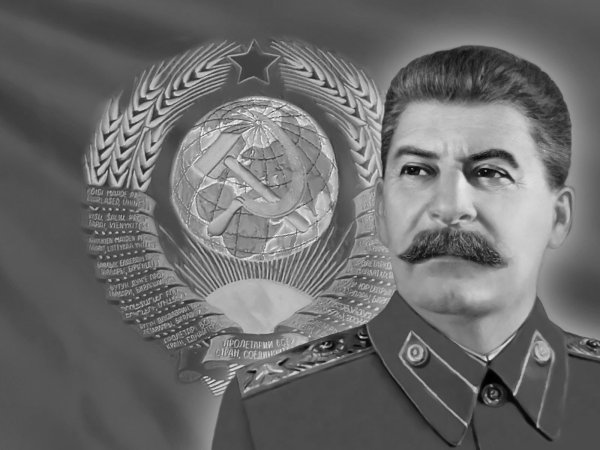 |
In conclusion to my story, I would like to
speak of friendship. A trip to such
far-off places often brings people closer.
This trip was certainly no exception to that
rule.
Marla and I have long been friends with Bill
and Sharon Shaw. In fact, Bill and
Sharon were at our wedding in 2004 and we
were at their wedding in 2005.
Unfortunately, it is difficult to touch base
with them these days because half the time
they live at their lake house in the Texas
pine forest.
Therefore it was a real treat to be able to
spend 10 days with Bill and Sharon on this
trip. Yes, Sharon beat me like a drum
at Casino, her beloved card
game, but I didn't care because it was fun
to have her company and Bill's. In
particular, one day we took a long walk
together that ended up at the amazing Melk
Abbey built so high one could touch the
clouds.
Marla and I did not know Trish and Bruce
Patterson very well before the trip, but
that changed in a hurry. We spent many
an evening drinking wine and exchanging
stories together. Once I found out
that Bruce went to St. John's here in
Houston, my oh gosh, the tales we shared!!
Trish has some very interesting theories
about wealth. She says it only takes
three generations to lose a fortune.
Interesting. I wouldn't know... I
haven't made my fortune yet.
Nevertheless, I was curious so I looked it
up when I got home... sure enough, Trish was
right.
Going from rags to riches is the popular
story, but the full story should be rags
to rags in three generations.
That's because children and
grandchildren of the fortune-building
super wealthy typically squander the
family's riches.
Statistics show that 65 percent of
family wealthy is lost by the second
generation and 90 percent gone by the
third generation, according to tax
lawyer and investment advisor Tim
Voorhees of Wealth Counsel.
Isn't it interesting all the things you can
learn when you share meals with interesting
people??
Two other guests on the trip who made quite
an impression on me were Ann Wasp and Vivian
Wang.
We had great fun playing the Liar's Game...
name two things about yourself that are true
and one that is false.
I did pretty well on the first round, but
once Ann and Vivian honed in on me, they had
my number. I can't fool anyone.
On the other hand, Vivian and Ann fooled me
repeatedly. Despite my lack of
cleverness, I had a good time. I now
know where all the tattoos are hidden on
Ann's body and how Vivian exchanged a smooch
for getting her tire changed.
See how much fun these trips are??
Ann in particular has a mysterious way of
drawing people out. Each night Ann got
turned our table into a group therapy
session.
And what exactly was Ann's technique?
Ann knows how to ask good questions.
That skill plus copious amounts of wine got
us all to talking about a lot more things
than we should have.
Unfortunately, their secrets are safe with
me. By the next day I had forgotten
everything. Now I am worried that they
remember what I said. Uh oh.
So why is Mary Pena frowning? Poor
Mary. Mary worried about everything.
You may wonder what Mary is so worried
about.
Do you see my hand on Mary's shoulder?
I am being affectionate. The problem
is that Mary thinks that Marla will get mad
at her if I put my arm around her... just as
I did in this picture. That explains
Mary's worried look.
For the record, Marla couldn't care less.
But don't tell Mary... I enjoy watching her
squirm needlessly. That's just the
kind of person I am.
I always give Mary a hard time.
Sometimes I muss up her hair. Mary
hates that, but her mistake was letting me
know how much she hates it.
However my favorite activity on the trip was
asking Mary which waiter she currently had a
crush on.
Mary can't seem to make up her mind.
One day it is Goran. The next day it
is Marko. The next day it is Milan.
Then there is Zoltan the maitre d' or Borat.
Another day, another crush.
It didn't help Mary at all that her buddies
Barbara and Jan were perpetually reminding
her just how cute the handsome waiters were.
Mary is just too much fun to tease.
By the way, Mary wasn't the only
troublemaker on the trip.
Linda Ingalls (in blue) is my buddy from
back in the days when my hair was still
brown. Yeah, we go way back.
Linda is currently encouraging her awesome
husband Stephen to learn how to waltz.
Stephen is getting pretty if I can say so
myself.
So why isn't Stephen in this picture?
Unfortunately Stephen stayed at home so he
could make enough money to send Linda on
this river cruise. Where does a girl
find a husband like that?
Linda was very cute... she took notes at
everything our tour guides said. I
have been on 38 cruises and I have never
seen anyone take notes before. Linda
is definitely one of a kind.
Speaking of rare birds, Jan Thomas, the one
with the red Viking sticker on her forehead,
was quite a character. I have never
seen a woman with more energy in my life.
Jan was also a bit on the talkative side.
Jan hung out with Barbara and Mary a lot.
With each new glass of wine, the giggles
increased. Jan kept her table in
stitches every night.
I did not get to know Debbie Edison very
well, but she definitely enhanced my picture
of the beautiful Austrian countryside.
Notice the plastic shield behind Debbie.
That shield serves as a wind breaker and
keeps people comfortable as they sit out on
the viewing deck.
So what color was the Danube? Was the
Danube blue?
No, for the record, the Danube was olive
green. Let me add that the Danube was
crystal clear and very lovely.
Debbie told me the story of how she met her
husband John at the Longhorn here in Houston
several years ago. How many times do I
have to say the easy way to meet someone is
to learn how to dance?
One morning as we took a walk into Passau,
Germany, I managed to persuade Ana Davis,
Patrice Kight, and Cheryl Simoneaux to smile
for me.
Those strange things around their necks are
called the Quiet Boxes. It isn't
obvious, but there is an earpiece attached
to those boxes. This system allows the
tour guide to speak to everyone without
anyone having to strain to hear her.
These boxes also allow people like me to
wander around and still listen into the
conversation.
By the way, that is Jimmy White with the
camera. Jimmy and his wife Helen
Kinnamon were with our group as well.
So here we have a picture of Mary finally
smiling for the camera. So why is Mary
smiling? Probably because I am nowhere
in sight... Marla took this picture.
Seated with Mary is her friend Barbara
Dailey. Barbara was also with us on
last year's Rhine River cruise, so it was
great to have her back with us this year as
well.
I apologize that I didn't get pictures of
everyone. The problem was that the
battery to my camera conked out after the
first day and I could not get it to
recharge.
Oh well. Very frustrating.
Fortunately Marla took up the slack with her
cell phone, so we got the important pictures
after all.
So why is Marla smiling?
I will tell you why... Marla had an
outrageous amount of fun on this trip.
Yes, she broke three ribs, but she still
managed to have a great time.
This was our 36th cruise trip together.
Yes, sometimes it gets old, but then we take
a trip like this one and all the magic comes back.
For one thing, we really enjoyed the people
in our group. Every night we had a fun
conversation with someone. Having
friends enhances a trip so much. For
one thing, I love having the chance to tell
a naughty joke once a while. The
problem is that Marla knows all my jokes...
so it is so great to have new people to
shock.
It was having having Bill and Sharon along.
I liked taking our walk in the woods with
them and it was fun playing cards with them
as well. It was fun sitting out on the
viewing deck watching castles with them.
I think Marla really appreciated their
company as well.
In particular, Marla and I both love Europe.
There are so many things we saw on this trip
that I haven't even bothered to write about.
So let me give a simple example.
That set of ruins up on top of the large
hill is known as Durnstein Castle.
This is the castle where King Richard the
Lionheart was kept imprisoned for a year
following his return from the Crusades.
Okay, just so everyone understands... I have
a real affinity for King Richard. That
is because my mother told me I was named for
the guy. In addition, I got seriously
hooked on the legend of Robin Hood and
Sherwood Forest. Don't forget that my
last name is Archer. So
forgive me for being such a sap, but as a
kid named Richard Archer, I used to
daydream all the time about being in Robin
Hood's band of archers. I even had my
own bow and arrow and green Robin Hood cap.
We all know the story of how evil King John
terrorized England in the absence of his
brother King Richard. We also know
that Robin Hood drove King John crazy with
his band of Merrye Men. Who can forget
Little John and Friar Tuck?
When I was a little boy, I saw a movie where
King Richard returns to England after being
freed from Durnstein Castle. King
Richard deliberately goes to Sherwood Forest
and thanks Robin Hood in person for keeping
his evil brother under control.
Therefore it was a real treat to see an
actual place where my hero had once been.
History came alive for me.
I salute my talented wife. Thanks to
her, I have seen the world and I have
learned so much. I know for a fact
that my life has been enriched dramatically
by our many travel experiences together.
I think my recap of the Danube trip has made
this abundantly clear.
Guess what? We aren't done yet.
During the trip, Marla indulged some
fantasies of her.
It turns out that Marla was just as inspired
by this trip as I was. In fact, Marla
talked openly about scheduling a return
visit to see the second part of the Danube
River in 2017.
In addition, she had a very unique idea.
Marla noted that that end of the second leg
of the Danube takes us very close to a place
known as Transylvania in the mountains of
Romania. Transylvania was once home to
Vlad III, Prince of Wallachia (1431-147677).
As a member of the powerful House of
Dracula, Vlad had a special hatred
for the Ottoman Turks who constantly sought
to invade his land. He made it a practice to
behead his enemies at the end of battles and
place their heads on stakes to warn off
further incursions. He became known as 'Vlad
the Impaler'.
During his lifetime, Vlad's reputation for
excessive cruelty spread abroad to Germany
and elsewhere in Europe. When Bram Stoker
wrote his classic novel Dracula in 1897, he
based Count Dracula on Vlad the Impaler as
well as the disturbing folklore of
mysterious Transylvanian Vampires.
Marla suggested we don Vampire costumes and
visit the Castle of Vlad the Impaler at
Halloween. I would imagine this would make
for a most interesting evening of Trick or
Treat. I wonder who will greet us at
the door?
You might assume I am teasing. Wrong. Marla
is completely serious. There is never
a dull moment with Marla around.
Whatever you think about her idea, don't say
'Impossible'.
|


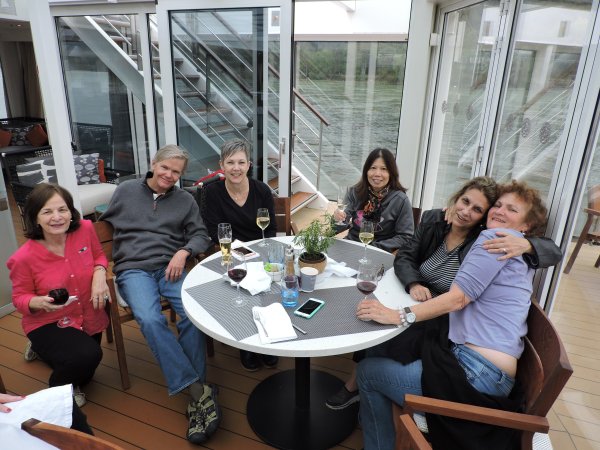
Barbara, Bruce, Trish,
Vivian, Marla and Ann, Marla's soul mate





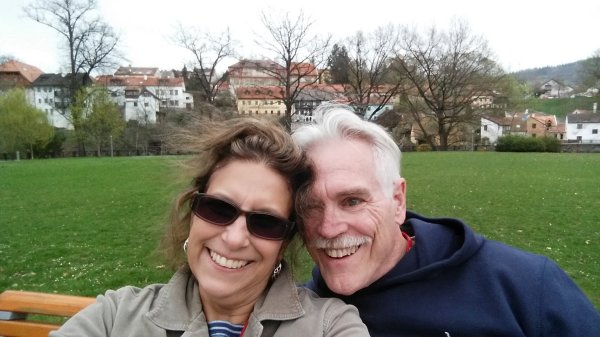
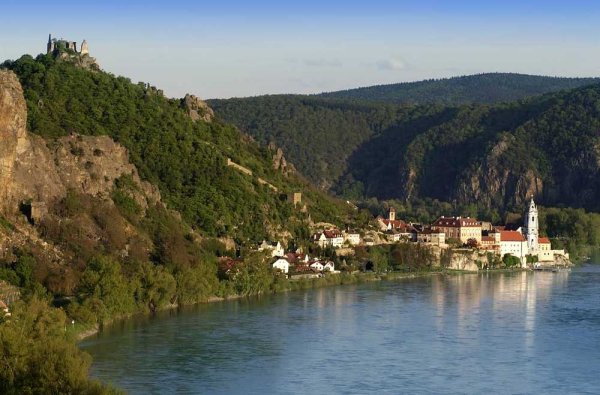

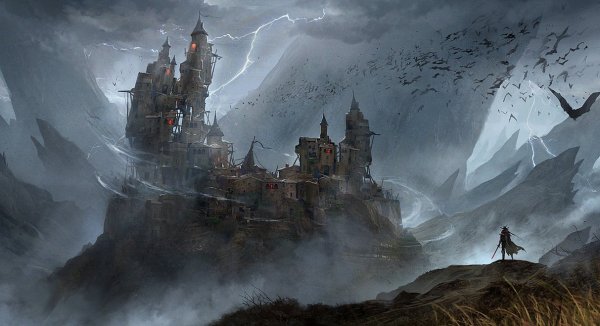 |
|
|
|
2016
Danube Waltz Itinerary
|
|
April 09: Day 1 |
Saturday |
Passau,
Germany |
|
April 10: Day
2
|
Sunday |
Passau,
Germany |
|
April 11: Day
3
|
Monday |
Linz and
Český Krumlov, C.R. |
|
April 12: Day
4
|
Tuesday |
Melk and
Dürnstein, Austria |
|
April 13:
Day 5
|
Wednesday |
Vienna,
Austria |
|
April 14: Day
6
|
Thursday |
Bratislava,
Slovakia |
|
April 15: Day
7
|
Friday |
Budapest,
Hungary |
|
April 16: Day
8
|
Saturday |
Budapest,
Hungary |
|
After
the trip concludes, why not extend your trip with a
two-day stay in Budapest? |
|
 |
|
|
About the Danube Waltz River
Cruise |
| |
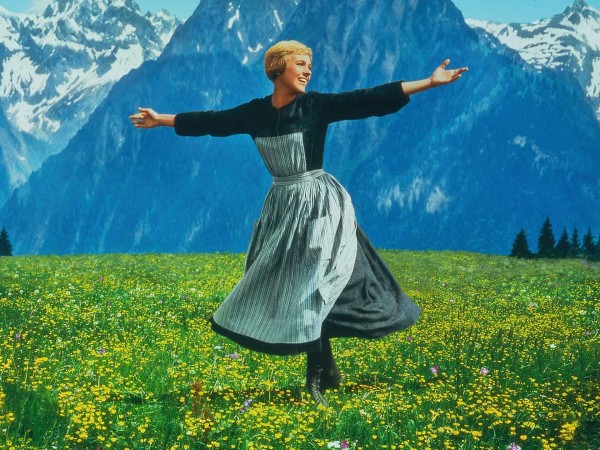 |
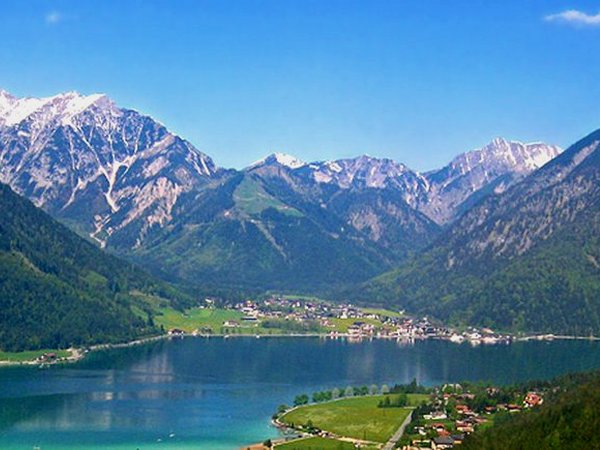 |
Austria, Land of the Castles
|
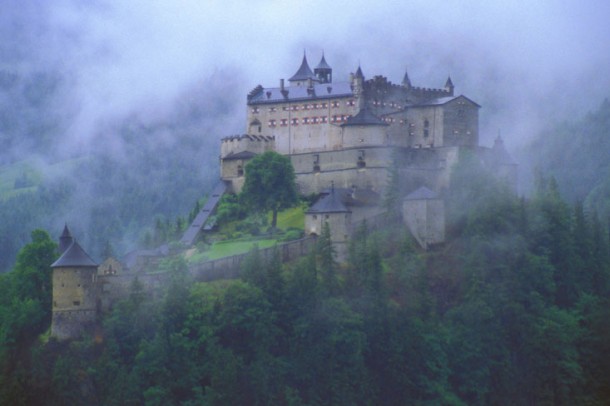
The
magnificent Hohenwerfen Castle
|
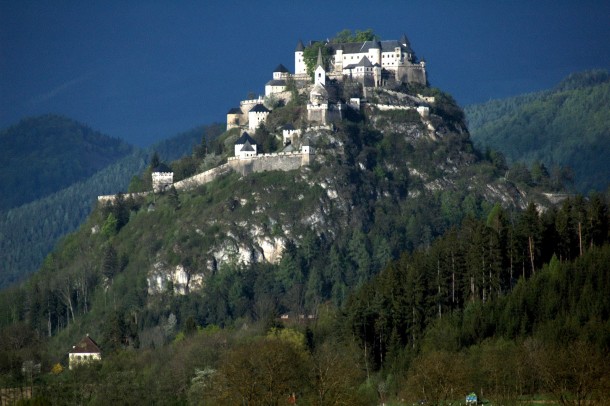
The
incredible Hochosterwitz Castle
|
Below
is a look at
the spectacular Schlögener Loop.
Although the
picture shows an amazing U-Turn, if one looks down from
above, this is actually a gigantic S-Turn.
This amazing
formation is about 20 miles east of Passau, the starting
point for our trip. The beauty of a river cruise is
that it gives a perspective that cannot be appreciated from
a car or a land point. There are simply places a
highway can't reach.
Similar to a
trip through the Panama Canal, the Danube River cuts through
a constant maze of unfolding scenery that is virtually
inaccessible by car. So why bother renting a vehicle?
Fortunately,
there is a much better option. Why not sit back on the
viewing deck of your river boat? From the comfort of a
rocking chair, you can take in the amazing scenery with your
friends, your camera, and a glass of wine for accompaniment.
|
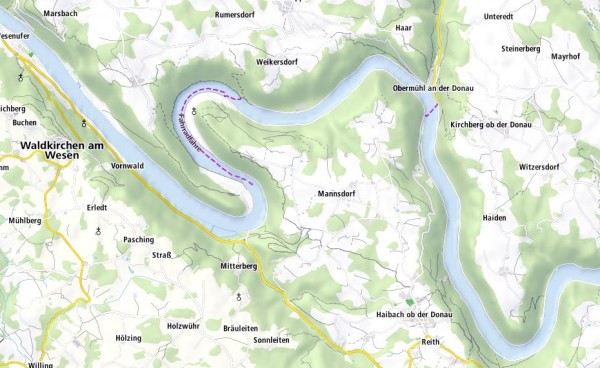 |
|